You are using an outdated browser.
We do not support Internet Explorer 6, 7 or 8. If you use Internet Explorer 6, 7 or 8, please consider upgrading to the latest Internet Explorer to have the best experience with our site. Or switch to a different browser, the web will thank you!
Home » Baby Travel » Travelling with a newborn: flying with a baby travel tips

Travelling with a newborn: flying with a baby travel tips
By Helen Wright
Planning on flying with a baby? Congratulations, you’ve reached the fifth trimester* (*something I made up to mark the moment you’ve completed all the gestating, birthing, learning to keep the little bundle alive, and so now the fun can really start!) But seriously, even considering baby travel makes you more intrepid than a lot of parents, with many admitting they wouldn’t dare think about travelling with a newborn or flying with a baby until they were at least three or four! As a travel journalist and blogger, I never thought twice about travelling with a baby, in fact, I couldn’t wait to get cracking. But despite my frequent flyer miles and enthusiasm, travelling with a newborn (and a, now, two year old!) hasn’t always been plain sailing. From my experience of 20 trips and 10 countries flying with a baby in tow, I can offer you these two pieces of advice: Relax and prepare . Seriously, it’s not as complicated as you think and can be very rewarding and, dare I say it, fun. Plus, travel can help you feel like yourself again, bond with your partner, allow you to be ‘not just parents’, to do something for you, create new memories and get a taste of the freedom you enjoyed before.
Below is my travelling with baby checklist: everything you need to know about flying with a baby, from baby travel items to travelling with a newborn and taking a baby on long haul flights. Mama, Dada, you got this. Just don’t forget the passports!
Does a newborn baby need a passport?
Talking of passports, yes, a newborn baby does need a passport. You can apply for your baby’s first UK passport at the British Passport Office . You do have to pay for your baby’s first passport and it may take longer than adult passport renewals, so make sure you apply for it in plenty of time. A note for mums, who like me, have a different surname to their babies – when you travel internationally without baby’s dad, you will also need to bring a legal copy of your child’s birth certificate. And this is not a drill – I have been asked on more than one occasion.
Is travelling with a newborn really hard?

I’m sure you will get different answers from different parents but my answer is no. In my experience, newborn babies are the easiest aged child to travel with. Travelling with toddlers on longhaul flights? Now that’s a different beast entirely. You’ll find that newborns, or a younger baby, travel well on planes. They don’t weigh much, sleep loads and don’t require much entertaining. The hum of the cabin often helps them drift off to sleep too. The key skill to have when flying with a baby, or any baby travel, is to be relaxed about the experience. From the parents that I have spoken to, the biggest thing stopping them from travelling with their baby is confidence. Positive thinking sounds like a throwaway phrase, but if you are relaxed and confident, this will translate to your baby, essentially reassuring them that everything is fine. If you, as the parent, feel stressed about the flight, this could have a negative effect on your baby, making them feel anxious and out of their comfort zone and possibly making them restless.
It’s important to consider other passengers and not be a selfish traveller (this is true of all people!) but don’t worry about what they are thinking, whether they are judging you or whether your baby is too loud, smelly or inconvenient. The primary thing to concentrate on is being calm and relaxed yourself, after that the mood and comfort of your baby, and, hopefully the impact on other passengers will take care of itself. Oh, and this ‘trend’ of bringing presents to give to passengers in surrounding seats is nonsense. I wouldn’t entertain that for a second and would feel weird if a parent gave me a gift to ‘apologise for their baby’. Poppycock!
Our first trip with Finn was to Mammoth Lakes, California !
Travelling with a baby checklist: what baby travel items do you need when flying with a baby?

My number one tip for baby travel is that the less you have to carry, the easier travelling will be . I get it, you’re going to be stuck on a plane for hours so the instinct is to pack everything your baby owns along with a few extras ‘just in case’. The most stressed parents I notice, almost always have too much stuff. Packing light means you can move much easier around the airport, have hands free to entertain your baby and will be less hot, bothered and laden as you board the plane. Stick to your baby’s favourite blanket and teddy bear, plus a few imaginative toys that ideally do not make noises.
We travel with stacking cups, an electronic game with buttons that flash and the sound can be turned off, and a learning toy (such as a Baby Einstein Octopus). Use items from the plane as new toys, such as cups, bottles, landing card, straws – anything they can play with or touch.

It is worth checking how easy it is to pick up baby supplies at your destination. Developed countries will likely have easy access to nappies, wipes, formula, baby food, fruit and cosmetics. Developing countries also now often have plenty of places to buy supplies but we always pack our own nappies now after Finn reacted badly to some disposable nappies we bought in the USA. I always carry my own, UK-purchased medicine (such as Calpol, nappy cream, and anti-allergy) with me on the plane to make sure I can always get to it easily. Overseas medications and cosmetics, including sun cream, are not tested to the vigorous standards we have in the UK and so you may find some are of inferior quality.
How many clothes and nappies do I need to carry on the plane for my newborn?
Ah, newborns and their constant nappy filling. I remember those days. Even though I stand by advice to not pack too much, it is wise to make sure you have enough clothes for your baby to wear for the whole journey (factoring in two/three hours at the airport before you board, plus travel time to your hotel). The general rule of thumb is to pack one nappy per each hour of the flight (just in case), along with two spare outfits. It’s also wise for parents to pack a spare top as well, in case of any puke / spills or leakage (from the baby, of course…), that may require a costume change.
Even if your baby is very young, talk to them and try to engage them in their new environment by showing them different parts of the plane, looking out of the window, telling them where they are and where they are going and generally letting them see your happy and calm face. If they think mum and dad are chilled, they will be too.
Baby travel: Flying with a baby long-haul

On our first long-haul flight with Finn (when he was four months old), despite being excited and ready to go, Simon and I still had a bit of anxiety about what the flight experience would be like. We came up with a strategy in advance. The flight was nine hours and so we decided to split the duration into three parts. This helped us manage our time and we felt more relaxed thinking about it as three, three-hour segments.
We took our Sleepyhead Deluxe pod, which fitted into the airplane sky cot. These can also go on your lap and across the tray tables (although some airlines wont let you do this). With the sleepyhead, Finn settled easily into an environment (and smell) he was familiar with. If you don’t have a sleep pod, even bringing your own blanket or sheet from home can help settle baby and make them feel secure. This also works well once you arrive at the hotel.

Despite being on the move, try to remember your baby’s regular feed and sleep times and try to stick to them as much as possible, even if they don’t fit in with the timings of the flight. Babies don’t adapt as well as we do, and a hangry baby is never going to be ideal on a plane. Hangry adults are no fun either, so also remember to feed yourself and keep hydrated. The better you feel, the easier the journey will be.
Air staff are usually extra accommodating when you have a baby, helping out wherever possible and providing hot water for heating bottles, extra pillows and moral support. Don’t be afraid to move around the plane with baby. As well as killing time for you, the cabin has plenty of things for them to look at and entertain them. People’s faces, flashing lights, intermittent noises – all of these things are fascinating for a young mind.
THE SIX ESSENTIAL BABY TRAVEL ITEMS I USE ALL THE TIME
When is it safe for a newborn to fly on a plane and how long can babies travel for free?
On most airlines, babies under the age of two can travel as a lap-sitting infant. This means they will not have their own seat and will be on your lap for the duration of the flight. However, contrary to popular belief, even lap-sitting babies do not travel free and the fee for them to travel is usually around 10% of the adult seat price.
Believe it or not, on most airlines you can fly with your baby from two days old! Although, some airlines do require that your baby is at least two weeks old. If baby is really young, check with your airline before you travel as they may ask you to bring a ‘fit to fly’ letter from your GP or midwife. If your baby was born prematurely, you need to count from their registered due date, not the day they were born (this is baby travel getting complicated!). Also, if mum had a caesarean section, your midwife might advise waiting for your six-week postnatal check-up before you fly. I definitely recommend waiting a little while before you go travelling with a newborn. They are more susceptible to virus, coughs and colds (etc) at a young age and planes are breeding pits for germs!
Can you buy a seat for a baby under two?

Yes – if you would rather not have your baby sitting on your lap for the flight, on most airlines you can purchase a full price seat for babies six months or above. For this, you will need to bring a compatible car seat (check with each individual airline) or a AmSafe Child Restraint System if your child is between 12-months and four years. The AmSafe is a belt and buckle device that attaches to the airline seat. On most airlines, these can not usually be used in first, business or premium cabins as they are designed to fit a standard economy seat. If you don’t have a proper restraint for your baby, they can still have their own seat but they will be required to sit on your lap with an infant seatbelt for takeoff, landing and turbulence.
Do lap-sitting infants get a meal?
In most cases, lap-sitting infants do not get a meal on the plane. You may be able to pick up an extra meal if the cabin isn’t full by asking the crew if there are spare meals, but infants are not allocated food. It is best you pack enough food and drink (or milk) for the duration of the flight and the time it may take to clear customs at your destination.
How much baby stuff can I check in?

Airlines across the world, and across the UK may have different rules but most airlines (both low cost and regular airlines) usually allow two checked items of baby equipment. This can vary from a travel cot, stroller or pram, car seat, back carrier and so on. This is in addition to any luggage linked to a paid adult seat. Lap-sitting infants do not usually get a checked bag in addition to this.
Do you need a travel pram?
We use the official pram bag for our everyday pram and always check it in with our luggage. Often we also cheekily use the pram bag to transport some other baby essentials such as nappies and wipes, which can weigh down your case. You aren’t technically supposed to do this but we have never been stopped. If you prefer, you can push your buggy to the gate (providing it is a stroller-style pram that folds in one piece). Ground staff will then put your buggy into the hold for you there but, since they are literally just thrown in under the plane, there is no guarantee they wont get damaged so I would never do this with our expensive pram.

Personally, we rarely take our pram to the gate. We just find the airport easier without a pram and often you can wait for ages at the other end before it is returned to you. We carry Finn through the airport in our Ergobaby 360 . This means we are hands-free to carry bags (or coffee!) and don’t get stuck behind crowds of people dithering about in the terminal. It makes boarding the aircraft much smoother and also comes in handy if you need to settle your baby by walking them up and down the aisles during the flight. Some airports, such as Gatwick Airport, offer prams that you can use to push your baby from security to the gate, which is helpful. Recently, we have started to use a travel pram, the GB Pockit stroller , on some trips. This pram folds so small it can go into the overhead compartment in the airline, which is very handy. Finn weighs a chunky two stone now so having him in the carrier for too long can be tiring. The GB Pockit helps when we are feeling lazy!

I have travelled with Finn and not taken a pram at all, such as on this recent trip to Lisbon . But generally, Simon and I like to go out for dinner and so having a pram with us means Finn can sleep while we eat. Hey, adults need quality time too! If I dine with him in the carrier I end up dropping food on his head!
Do I need to bring my car seat?

When travelling with a newborn, the car seat is one of the biggest hurdles to smooth baby travel. The rules vary from country to country. Put simply, the actual rules are: If you have a European car seat and you are travelling to a European country or a country that accepts European approved car seats, it may be cheaper for you to take your own seat. Unless you have paid for your baby to have their own cabin seat, this will need to be checked in as one of your two allocated ‘baby travel items’. If you have a European car seat and you are traveling with a baby out of the EU, say to the USA, Australia, New Zealand and some other countries, you are required by law to use a c hild seat approved by the country you are visiting . So if you are driving in the USA , you should have a U.S. approved car seat. You may want to rent this from your rental car provider or, as we discovered on our trip to California , it was actually cheaper to buy one from Walmart!
However, it does seem that most parents either do not know these rules or choose to ignore them. If you do take your own car seat and fix it in properly, your child will be as safe as they are at home. Just bear in mind that in the event of an accident, your travel insurer could use this as a reason not to pay out so you will be taking that risk.
Finally, and I am no medical or child expert so any advice given here should be researched by the individual parent, it is my opinion that short journeys (such as in a cab to your hotel) do not really need a car seat at all. I usually take Finn in the Ergobaby, facing me. Then I seatbelt myself in, making sure the cross-body part of the belt is not across his spine. I have found this to be a quick and easy way to use cabs or go on short car journeys without the need to take my car seat everywhere. However, in my experience, if you would rather use a car seat at all times, many pre-booked airport transfers offer infant car seats on request.
Read my definitive list on what baby travel items I do take here .
Breastfeeding and traveling with breast milk

One of the reasons I was determined to breastfeed, was to make baby travel easier. It goes without saying that if you can feed your baby any time, anywhere, by attaching them to you, life is generally much more simple (and far less washing up and carrying stuff is required!) Aside from the health benefits, for mums that want to be more mobile I highly recommend attempting to breastfeed. I had a few struggles at first and used a local breastfeeding help resource (Islington breastfeeding) and they helped me so much. Once you’re through the pain barrier – that struggle is real! – trust me it will be worth it ten times over.
Breastfeeding Finn meant we could go on this day-long hike around Mammoth Lakes .
One of the questions I am asked a lot is about traveling with breast milk, flying with breast milk and whether you can take expressed breast milk through airport security. The answer is yes, you can bring expressed breast milk through airport security in individual containers no more that 2000ml each in size. Quick note, this is the standard rule for UK airports, but best to check international airports just in case. Each container will need to be screened at security and airport staff might need to open the containers to screen the liquids. In my experience, bottles have never been opened and the milk inside is never touched. They have a cool-looking machine that screens the milk without needing to open the containers.
If you are planning on traveling with frozen breast milk, you will not be able to travel with frozen breast milk in your hand luggage. Frozen breast milk can be stored in checked luggage but only non-frozen breast milk can be taken through airport security and into the airline cabin. You can also carry formula, soya milk, cows milk, baby food and sterlisied water through security – guidelines suggest you can take as much as you need for your journey, but there is no set amount.
Bottle feeding – do I need to travel with my steriliser?
Even when we began combine-feeding, I never once travelled with my steriliser. I have spoken to people who have, but I can’t ever imagine travelling with a newborn and with something as chunky and cumbersome as a bottle sterilizer! We used the absolutely brilliant self-sterilizing Mam Bottles . These can be sterilized individually in a microwave using a small amount of water. No need for Milton sterilising tablets or other chemical cleaners. In destinations where we found ourselves without easy access to a microwave, we used boiling water from the kettle and left it a little bit longer with the lid on. We had no problems and I can’t recommend them enough!

What baby jabs do I need for my destination?

If you are travelling to a long-haul destination, you may be required to have a travel vaccination to protect you from tropical diseases, such as malaria. When it comes to travel jabs for babies, you will likely find that your baby is too young to have them. The best resource to find out about infant vaccinations when travelling with a baby longhaul is the NHS platform Fit for Travel . It is also recommended that you see your GP or midwife around 6-8 weeks before you fly.
We travelled to the Indian Ocean when Finn was eight-months-old .
Baby travel: can I use insect repellent on a baby?

If your baby travel plans take you to somewhere that mosquitos and other bitey insects are a concern, you may need to think about using an insect repellent. There is a lot of incorrect information on the internet about insect repellent and babies and so I thought I would set the record straight. According to the most up to date research from the NHS , it is safe to use insect repellent on babies aged two months and older. Concerns before tended to be around the ingredient N,N-Diethyl-m-tolumide (Deet). There are other ingredients that are said to repel mosquitos but Deet is proven to be the most effective. You may also wonder if it is safe to use insect repellent during pregnancy. Research says that products containing up to 50 per cent Deet are safe for you to use in pregnancy and when breastfeeding. It’s also worth noting here that products over 50% Deet can cause skin irritation on anyone, so best not to go too high. When we camped in Asia we used an 80% Deet product on the exterior of our tent but never on our skin or clothes.
If you’re worried about baby insect bites and your baby is under two months old, there are natural remedies available such as this range Incognito from Holland and Barrett . Another tip is to buy some breathable netting material and wrap it around your car seat / cot or pram, gathering at the top with a peg.
All said and done, I highly recommend travelling with a newborn and making the most of your maternity leave – and the fact baby can travel for free (almost). Good luck, and remember to follow us on @Passportstampsuk and @PassportBaby for more family friendly travel tips and products.
Helen also writes a family travel column for juniormagazine.co.uk
HAVE A LOOK AT SOME OF THE DESTINATIONS WE HAVE VISITED WITH OUR BABY
Hiking in Lake Tahoe, California
Exploring Marrakech, Morocco
A road trip around Lake Garda, Italy
A brilliant trip to Dubrovnik, Croatia
This dream hotel for VIP babies in Mauritius
A motorhome road trip around Oregon, USA
Our Orlando itinerary – two weeks in Orlando
Staying at Universal Orlando’s Cabana Bay Hotel .
What it was like to be in Florida during a hurricane .
A day trip from Orlando – to Daytona Beach
VIDEO: A multi-generational holiday to SeaWorld, Orlando
Share this post
Related posts.

What is the best age for Disneyland Paris?
It's the million-Euro question

Flying Virgin Atlantic with kids – everything you need to know
Everything you need to know about flying Virgin Atlantic with kids

Mini turbo guide to Super Nintendo World Hollywood
LEVEL UP - the new immersive land at Universal Studios

Plan the ULTIMATE Florida Road Trip
The best Florida road trip for families
- Getting pregnant
- Preschooler
- Life as a parent
- Baby essentials
- Find your birth club
- Free antenatal classes
- Meet local parents & parents-to-be
- See all in Community
- Ovulation calculator
- Am I pregnant quiz
- How to get pregnant fast
- Best sex positions
- Signs of pregnancy
- How many days after your period can you get pregnant?
- How age affects fertility
- Very early signs of pregnancy
- What fertile cervical mucus looks like
- Think you're pregnant but the test is negative?
- Faint line on pregnancy test
- See all in Getting pregnant
- Pregnancy week by week
- How big is my baby?
- Due date calculator
- Baby movements week by week
- Symptoms you should never ignore
- Hospital bag checklist
- Signs of labour
- Your baby's position in the womb
- Baby gender predictor
- Vaginal spotting
- Fetal development chart
- See all in Pregnancy
- Baby names finder
- Baby name inspiration
- Popular baby names 2022
- Numerology calculator
- Gender-neutral names
- Old-fashioned names
- See all in Baby names
- Your baby week by week
- Baby milestones by month
- Baby rash types
- Baby poop chart
- Ways to soothe a crying baby
- Safe co-sleeping
- Teething signs
- Growth spurts
- See all in Baby
- Your toddler month by month
- Toddler development milestones
- Dealing with tantrums
- Toddler meals
- Food & fussy eating
- When to start potty training
- Moving from a cot to a bed
- Help your child sleep through
- Games & activities
- Vomiting: what's normal?
- See all in Toddler
- Your child month by month
- Food ideas & nutrition
- How kids learn to share
- Coping with aggression
- Bedtime battles
- Anxiety in children
- Dealing with public tantrums
- Great play ideas
- Is your child ready for school?Top tips for starting school
- See all in Preschooler
- Postnatal symptoms to watch out for
- Stitches after birth
- Postpartum blood clots
- Baby showers
- Sex secrets for parents
- See all in Life as a parent
- Best baby products
- Best formula and bottles for a windy baby
- Best car seats if you need three to fit
- Best nappies
- Best Moses baskets
- Best baby registries
- Best baby sleeping bags
- Best baby humidifier
- Best baby monitors
- Best baby bath seat
- Best baby food
- See all in Baby essentials
- Back pain in pregnancy
- Pelvic girdle pain
- Perineal massage
- Signs you're having a boy
- Signs you're having a girl
- Can you take fish oil while pregnant?
- 18 weeks pregnant bump
- Can you eat salami when pregnant?
- Edwards' syndrome
- Missed miscarriage
- Should I harvest my colostrum?
- Rhesus positive vs. Rhesus negative
- What do contractions feel like?
- Hunger in early pregnancy
- First poop after birth
- When do babies sit up?
- When can babies have salt?
- MMR vaccine rash
- Vaping while breastfeeding
- How to transition from formula to milk
- When do babies start grabbing things?
- Sperm allergy: can sperm cause itching?
- How long after taking folic acid can I get pregnant?
Travelling with a newborn to eight-month-old

When is my baby old enough to travel?
What’s the best way to transport my baby on holiday, what do i need to pack for my baby when we’re going away, how can i keep my baby happy when travelling, car accessories to help when travelling, how can i feed my baby when travelling, how can i keep my baby safe when travelling in the car, how can i keep my baby happy when travelling by plane.
- If you are booking a holiday and your baby usually sleeps in a cot, do ask for one when you make your reservation. Discovering there is no cot when you arrive at your destination with a tired baby is not a good start to a holiday.
- If you take along your own travel cot, pack one of their bed sheets, too. The familiar smell of your laundry may help settle your baby when you’re away.
- If you are buying a carrycot for your travel system, consider choosing one that is suitable for overnight sleeping. Not all of them are. It will be easier than taking a travel cot when your baby is small. At home, you can use the carrycot instead of a Moses basket.
- If your baby wakes when the sun rises, pack a travel blackout blind or blackout curtains. Not all rooms have thick curtains or shutters.
- If you’re travelling somewhere hot, a baby sun pod will keep your baby shielded from the wind and the sun . Make sure your pushchair has a sun canopy or umbrella, too.
- You may also want to take a plug-in baby monitor or night-light with you, which is useful for settling your baby back to sleep in an unfamiliar room. You may need a plug adapter, too.
- Take along a couple of their favourite toys and books . Stacker cups are brilliant as they can double up as bath toys.
- If your baby likes a bath as part of their evening routine, a universal bath plug is very useful. It will turn a shower into a bath. Or you can put socks over the taps and bathe them in the basin.
- And of course, take along your camera to capture all the fun.
- nappy rash cream
- changing mat
- sunhat and sunscreen
- first-aid kit
- breast pump
- travel steriliser kit
- formula milk
- anything shiny
- baby-proof mirrors
- musical toys
- soft animals
- plastic keys
- teething rings
- Older babies might also enjoy listening to songs or even an audio book in the car.

- Get some removable window shades for your car to shield your baby’s skin and eyes from the sun.
- Make sure your baby’s car seat is properly installed and that the seat belts, if used, are correctly threaded. Your baby should travel in a rear-facing car seat installed on the back seat of your car. Never place your baby’s car seat on the front seat of a car with an activated passenger air bag .
- Never smoke when your baby is in the car. It's illegal to smoke in a car when a child (defined as anyone under 18) is present. The law doesn’t cover e-cigarettes (vaping), however it is not recommended – so don’t vape or let anyone else vape when your child is in the car.
Was this article helpful?
Holiday packing checklist for your baby

When is it safe to fly with my baby?

How to find what you need for your baby in Spain

Travel and summer essentials

Where to go next

- Skip navigation
- Find a branch
- Help and support
Popular searches
- Track a parcel
- Travel money
- Travel insurance
- Drop and Go
Log into your account
- Credit cards
- International money transfer
- Junior ISAs
Travel and Insurance
- Car and van insurance
- Gadget insurance
- Home insurance
- Pet insurance
- Travel Money Card
- Parcels Online
For further information about the Horizon IT Scandal, please visit our corporate website
- Travel tips for babies, toddlers and young kids
It’s your holiday too, and good preparation can take some of the worry out of travelling with your littleuns.
In our guide, we’ll go through everything you need to know about flying with kids – from staying comfortable at the airport to the documentation or travel cover you might need.
Posted: 27/1/2022 | By Amanda Duffy
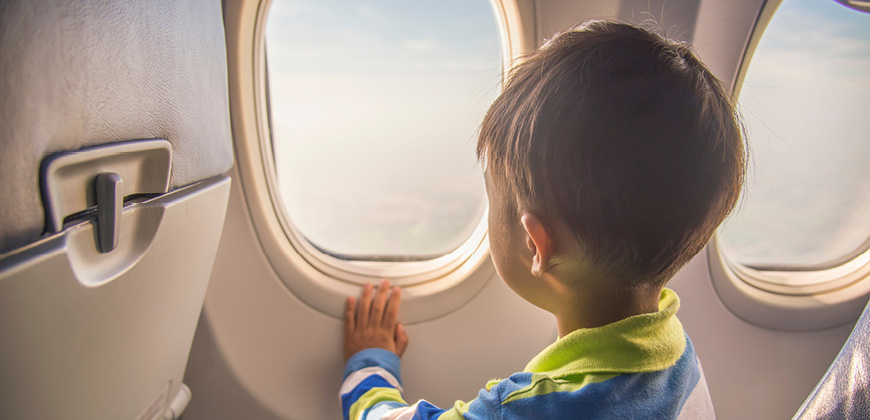
Before you fly: booking your flight tickets and seats
If you’ve got the luxury of time when planning your trip, then we’ve got a couple of tips for looking ahead that give you that little extra in terms of ease and relaxation.
Try to book off-peak flights
It will be both more comfortable and safer if there are fewer people at the airport when you’re waiting to board. Staff will be more able to help with any last-minute requests, too.
Try to get night-time flights
If it’s a long-haul flight, see if you can book one that flies through the night. This means that your kids are in an environment designed for sleep and might make it through the flight without too much fuss. But remember that other passengers will be trying to sleep too.
Do your research
Shop around among airlines. Some are more accommodating than others when it comes to kids, and for the sake of a few quid it can make a massive difference. They may allow very little children to sit on your lap for the flight, which can also mean a reduction in the cost of the ticket, so be sure to ask.
Protect your family on holiday with good travel insurance
Pre-flight preparation.
You’ve booked your flights and you know what to expect while you’re in the air. Now comes the planning for either end.
Always bear in mind that flying can be a magical and exciting experience for kids, especially the first few times. So throughout, it can pay off to make it seem as fun as possible.
Dress them in something memorable
You might be sitting in a terminal for a while. Dressing them in something easy-to-spot will be important if they should wander off.
Take a photo of them on your phone
Once they’re in their memorable outfit, take a photo with your phone. If they go for an unexpected explore, it’s much easier for others to help find them if they know what they’re looking for.
Bring their furry friends
No, not pets. But stuffed toys that they love can be comforting and familiar in a busy environment. And they can double-up as pillows during the flight.
Make sure your gadgets are match fit
Gadgets can be your best friends when keeping kids entertained. Tablets and phones have any number of games and streaming services available. So whatever you need – from an iPad to Bluetooth headphones – make sure they’re fully-charged and fully-functional, and bring a portable battery pack to give something more juice should they run low.
Remember that, particularly in the UK, power points in airports can be hard to find. Don’t rely on any being available.
Plan for delays
Hopefully everything will run smoothly. But if they don’t, it could be stressful if you haven’t anticipated being stuck at the airport for a while.
Some travel insurance policies include (known as flight delay assistance , which can help make prolonged stays in departure lounges more comfortable.
Give yourselves time
You might have yourself totally under control and be used to waltzing through security straight onto your flight. But kids have minds of their own and are talented at complicating things. Make sure you’ve got plenty of time for snacks, trips to the loo and perhaps the odd tantrum.
Keep it light
Maintaining the idea of excitement, fun and the magic of travel can make the environment an adventure rather than a threat.
Make sure your hand luggage has everything you need
Anything that’s in your hold luggage will be out of action from the point you check it in to the time you haul it off the baggage reclaim belt the other end.
So make sure that everything you could possibly need is in your hand luggage. Here’s a quick checklist to help you out:
- Wet wipes and hand sanitiser
- Snacks and treats
- Boiled sweets (such as lollipops) – we’ll come to those in a minute
- Tablets, handheld gaming devices, battery packs
- Pens and paper
You know what your children like to do best, so be sure to pack it. And remember that they might be able to take hand luggage of their own if they’re over a certain age. Just make sure they don’t lose it.
Flying with a baby
Flying introduces a whole new world of discomfort to babies, so you can help your baby and yourself by planning for them.
The first thing to do is make sure your baby is old enough to fly when booking your flights. In general, you’re unlikely to be booking a flight for immediately after giving birth, so it’s probably not an issue, but airlines have differing policies on what a minimum age to fly is.
It is normally two weeks old, but there is some variance so make sure you check this before booking.
Do I need a baby passport?
Yes. Everyone travelling needs a passport, even very young babies. Getting one, however, can take time. So make sure you book flights to factor in the maximum amount of time this could take.
To (known as apply for an infant passport you need to apply with a completed application form, your baby’s birth certificate and two identical colour photos of your baby with a signature from a professional who has known you for at least two years.
There are strict rules for adult passport pictures (light background, no one else in the picture, both eyes open, etc.) but the passport office are a little more relaxed when it comes to babies.
Check the government’s advice on (known as passport requirements and the application process . And you can use the (known as Post Office Check & Send service to make your application.
Baby essentials checklist
Firstly, planning is everything. You know how often your baby needs feeding so you can plan for this. Always take more than you need in case of delay.
No one aims to leave something behind. But in the stress of getting ready, anybody can be forgiven for not keeping track of absolutely everything. Here’s a checklist to help you tick things off:
- Changing mat
- Teething ring
- Milk / powdered milk
- Food and snacks
- Cotton wool
- Pram/stroller/bassinet
- Water sterilisers
- Clothes (for you both)
- Rusks (if you need them)
- Anti-histamines
- Nappy cream
- Moisturising cream
- Sheet for travel cot
- Baby cutlery
- Nasal aspirator
Make sure you've got the items you need with you in the cabin for the flight, as long as they are allowed. Check with your airline which of the items listed can be transported in the cabin and which need to go in the hold.
Travelling with a toddler
Toddlers have different needs to babies and require a different approach when planning travel.
The name of the game is staving off boredom. Boredom is the lit fuse under tantrums, sulks and all manner of undesirable eventualities. So having a varied source of amusement is crucial.
Once again, preparation is key. We’ve already taken a brief look at what kind of preparation you can do to keep your little ones entertained in the departure lounge and during a flight. Here we go into a little more detail.
The most obvious thing to give your toddler(s) is the ability to occupy themselves with games and activities. Tablets and smartphones are a great resource as they can contain a huge variety of games in one place.
But, like the rest of us, kids can get fatigued by looking at a screen for too long. It’s also important to have a ready supply of books, colouring books and old-fashioned games (such as cards) for more interactive entertainment.
Staying safe
As well as having a photo of your child on your phone in the clothes they’re wearing, you can also consider having them wear a bracelet with your phone number on it.
Spillages and accidents can happen at any time. Make sure you’ve got the necessaries to deal with whatever might occur, from spare nappies to spare clothes – and a plentiful supply of wet wipes.
Bring plenty of healthy snacks. Not only is this important for when they get peckish, but can also be a last-ditch way of averting the boredom.
Also, pack hard sweets like lollipops. The change in air pressure as you take off and level out at altitude can be incredibly painful – everyone who’s flown will know the sensations – but it’s especially acute for those unused to it. Sucking sweets can help ears pop and return to the correct pressure.
On the plane
What can i take on the flight.
There are strict regulations about liquids on flights. Fortunately, baby milk, baby food and formula aren’t included in this, though you might be asked to taste the food for security reasons. Everything else is, so if you have more than 100ml of something you need – such as nappy cream – you’ll probably be asked to throw it away.
Your pram/stroller/bassinet will go in the hold. Depending on the airline, your baby may be allowed to sit on your lap during the flight . Some airlines require babies to be secured in a car seat on a seat of their own. So if you’re taking a car seat with you, whether it goes in the hold or the cabin will likely depend on the airline’s own policy.
Food and snacks are usually fine to take through security. To make things nice and easy, don't bring anything that's particularly messy or sticky.
Read our full guide to (known as what you can take on the plane .
Have a good flight!
The cabin crew are trained to help you with your baby should you need it during the flight. Don’t be afraid to ask what to do if you’re unsure.
Keep an eye out for spare seats. If your flight is under-booked then there maybe spares where you and your child can stretch out for a nap if your own seats are too cramped. But make sure to stay with your child if they want to move.
Sucky sweets, as mentioned before, can help ears pop, so be sure to bring some.
Other travel problems
Nervous flyers.
Lots of people are nervous flyers. If your child appears that they may be anxious at the prospect, helping them to frame the experience as fun, safe and adventurous may help.
Knowledge is power, as the saying goes, so you can take them through how planes work and mention that (statistically) it is the safest mode of transport on earth.
Motion sickness
Motion sickness is caused when your eyes and your inner ear can’t agree on what’s going on, and it can be very unpleasant. It is especially common in children and while it’s typically at its worst on ships, in cars and on fairground rides, it can occur on planes too.
There are a range of treatments available but not all of them work on every person. So if you know that your child suffers from motion sickness, make sure you’re stocked up with the treatment that works best for them.
Stay fed and watered
Flying can cause dehydration, particularly in children. Even if they don’t feel like it, make sure your kids are taking enough fluids. You know what they like best, so you might want to bring enough of it to get through a long stint in an airport. Remember that you can’t take it through security though.
Hunger can also make for irritation and bad mood. Keeping a ready stash of snacks on-hand can mean you’re prepared to handle the hunger demons.
Keeping kids safe
Airports can be large, noisy and busy places where it’s important to be able to keep an eye on your kids. Similarly, once you’re on holiday, your tried-and-tested routine at home for keeping everyone safe and accounted for might need a few tweaks. Here are some thoughts on keeping kids safe when travelling.
Make a plan that lasts the whole holiday
Before you go away, you can give your kids a plan to follow should they become lost that they can follow in most circumstances. For instance, create a list of trusted people they can ask for help – such as police officers, a member of hotel staff or other parents with small children.
Prepare for the unexpected
When you’re travelling, keep a wristband on your child with your mobile number on it. No one wants to think about their child getting lost, but if they do, this is a good way for anyone finding them to get in touch with you.
Know your surroundings
You can make sure you’re familiar with an area before you leave with the help of increasingly sophisticated online maps. This is a good way to be aware of any hazards (like areas with strong tides, for example) as well as planning places to meet.
Online research can also help you identify where all the swimming pools are from a safety standpoint, or where to access the nearest medical facilities or pharmacies if needed. If you can’t find this out before you go, make sure your find out when you check in at your accommodation. You could ask at the same time as finding out when your reps are available.
The same applies to your room. You know your child best, as well as which hazards might worry you. So if you see balconies with railings which are too far apart, or some dubious electrics, tell your venue’s management.
Sun protection galore!
Children’s skin is more vulnerable to sunburn that adults’ and so you will need a higher factor sun cream than you take for yourself. Make sure you are reapplying this sun protection periodically throughout the day, even late in the day when the sun can still be strong, and especially if they like playing in the sea or pool. Sunburn and prickly heat can be distressing for children – more so than for adults – and it’s an easily avoidable situation with the right planning.
Don’t forget a sunhat as well as a T-shirt that your kid doesn’t mind soaking and potentially sun-bleaching in case they get burned and still want to play in the sun. Make sure your child drinks plenty of water throughout the day – and that goes for you, too. The same applies to ski trips, where the glare from the snow can intensify the sun’s burning potential.
Know the risks of the sea
Swimming in the sea is great fun, especially if you get to do it somewhere that doesn’t feel like you’re jumping into an ice bath.
Only swim in parts of the sea where it’s safe to do so and there’s a lifeguard in attendance. You might want to (known as research rip tides and currents and practise identifying them, as well as what to do if you find one.
Ghic and travel insurance
If you’re travelling in the EU, make sure you have a (known as UK Global Health Insurance Card (Ghic) or a valid (known as European Health Insurance Card (Ehic) , which the Ghic has replaced. These cards are free and entitle you to emergency and necessary state healthcare in EU countries for the same costs as residents. If you need such treatment, you’ll get it at substantially less than without a card – possibly even free in some countries.
It’s also vital to have good (known as travel insurance when you go away. It may protect you while you're away in the event of emergency requirements a Ghic or Ehic wouldn’t cover, such as air rescue or repatriation to the UK if needed. It may also help safeguard against a whole host of holiday issues too, including loss, theft and damage of personal possessions, cancellations and delays.
Pack enough medicine
Bring enough of the medicines that your children need to last you the whole holiday (as well as anything they might need in-flight).
If you need to take a prescription medicine, make sure you bring copies of the prescription as well a doctor’s notes explaining why it’s needed. Remember that it could be on a list of prohibited medicines in the country you’re visiting, so contact the relevant embassy if you’re in doubt.
Check our 10 tips for (known as keeping your kids safe on holiday .
Interested in travel insurance?
Some common questions.
If you see a question below that you’re asking yourself about flying with babies or young children, click or tap it to reveal an answer.
At what age is it okay for my baby to fly?
When flying with a baby, you need to do a bit of research with your airline to find out their rules on travelling with a newborn on a plane.
While legally there’s no minimum age for babies to travel, airlines have different booking policies and charges. In general, most airlines ask that babies are at least two weeks old when travelling, although some may allow seven-day-old infants to fly.
Where should I sit when flying with a baby?
Make sure your children are always accompanied. If you’re flying with a baby, some airlines will allow them to be held on your lap during the flight, and some will require them to be sat in a car seat in their own seat. If on your lap, you’ll be given an extra belt to fit around your baby on the plane during take-off, landing and turbulence, while a car seat will be secured by the existing lap belt.
Sitting them on your lap might also mean a reduction in the cost of the ticket, so be sure to ask. Either way, one of the cabin crew will be able to help you fit the seat or the belt securely.
To make sure your child gets a decent bit of rest on the flight, keep an eye out for empty seats. If you spot one, ask if you can move across.
During the flight, keep your baby calm by getting them interested in their new surroundings or taking a walk up and down the plane.
Finally, on take-off and landing, make sure your baby has a drink, since swallowing helps to equalise the change in air pressure and avoids pain in the ears.
Does my child need a car seat on a plane?
You may be able to bring your own car seat onto the plane for your child to sit in – find out if it's allowed on your airline. It'll give your child something familiar and comfortable to sit in for the whole journey – though it's going to be bulky to carry.
Can I bring water for baby formula on a plane?
While there are strict regulations on taking liquids onto planes , you are allowed to carry a 'reasonable amount' of breast milk, baby food, milk formula and boiled water on board without worrying about the 100ml restriction.
You'll struggle to find a definition of a 'reasonable' amount, so work on the priciple of having enough for the flight plus a little extra in case of delays.
Note that you may not be able to carry it in a flask. It may need extra security checks. And remember that baby products such as lotion or nappy cream are still limited to 100ml and must be carried in a clear plastic bag.
Do lap infants get a carry-on luggage allowance?
Your baby may not need as much space for clothes as you, but they will have a lot of equipment, so it’s worth finding out how much extra baggage you can take on board the plane.
Some airlines will give your baby or infants under 2 years their own baggage allowance of 5-10kg, even if they don’t have their own seat. But you should always check with your airline about their own baggage policies for babies flying with them, as you may be hit with an extra charge for your infant’s equipment.
Is a nappy bag considered a carry on?
In most cases, airlines will allow some extra carry-on baggage if you’re travelling with young children, especially babies. This extra allowance may include a nappy bag.
None of this is guaranteed, though, and the rules can vary not just by airline but also where you’re travelling to – such as domestically or internationally.
So, before you fly – or ideally before you book, check your airline’s policy details closely. Remember that if you’re buying a seat for your child rather than having them sit on your lap, it will automatically come with its own baggage allowance.
Do car seats and strollers fly free?
Most airlines will allow you to take a car seat and a pushchair onto the plane for free – something you’ll be thankful for when making the long walk through the terminals. But you should always check with your airline about their carry-on policies for babies flying with them well in advance of travel so you’re not caught out by extra costs or restrictions.
Can you change a baby on a plane?
If the seatbelt light is off and the toilets are available, you’re free to change your baby using those facilities. Some airlines’ toilets include a changing shelf, though you should check with your airline.
If your child’s toilet training, take a few spare sets of clothes in case of accidents. You could also consider taking some pull-up nappies for when the seatbelt sign is turned on.
Can you book a bassinet on a short-haul flight?
A bassinet is a cot that can be attached to one of the bulkhead seats on a plane. Some airlines will allow you to reserve one for certain flights. They’re often free to use, but there may be a charge to attach them to a bulkhead seat.
It’s rare to find them on short-haul flights – they’re usually kept for long-haul only – but not impossible, and it’s always worth checking with the airline you’re travelling with. If available, check the airline’s policies on the age and weight of children that can use them, as these can differ by operator. And make sure you reserve it in advance.
Other travel products
Order foreign currency online or in selected branches. Pick up in any branch or get it delivered to your home.
One prepaid Mastercard™ that stores up to 22 currencies.
Get your passport application right the first time. We can even complete and submit it for you digitally.
This might interest you
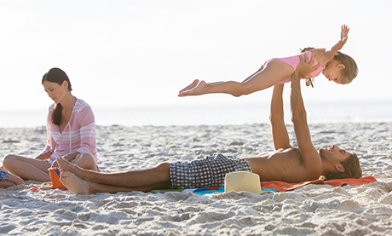
We all know the feeling – getting to the airport, then a wave of panic comes ...
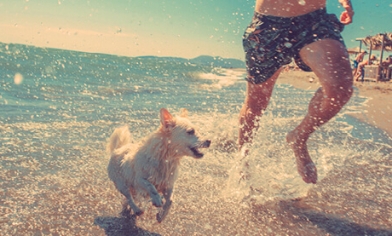
Taking your best friend on holiday with you is everyone's ideal situation, but ...
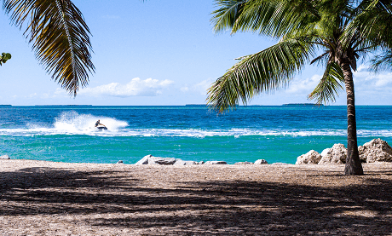
The whole idea of lounging around on the beach is to switch off and enjoy the ...
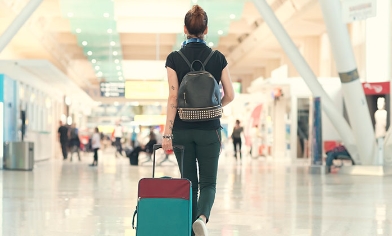
Ready to jet off on a much-needed break but worrying about what you can take ...
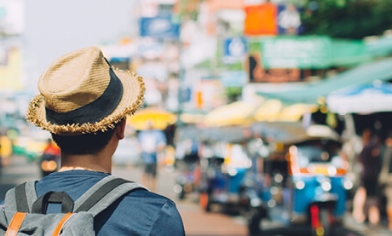
Whether you’re travelling solo because of business, you’re hoping to meet ...
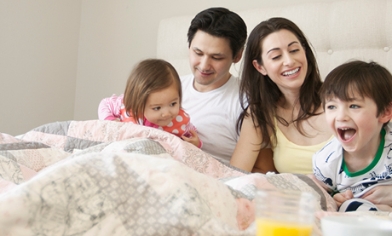
The arrival of Airbnb has helped to transform the travel industry in recent ...
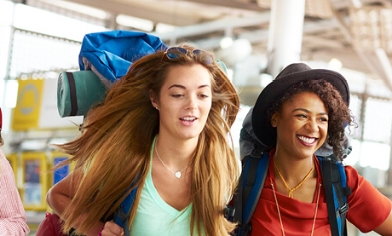
Having your son or daughter go on holiday without you for the first time can be ...
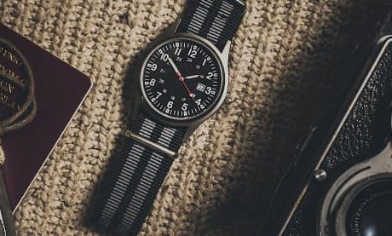
Exploring the globe can be scary, but there’s so much to find at the edge of ...
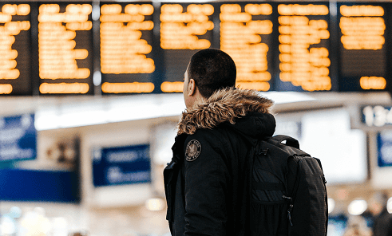
In an average year, millions of Britons go abroad without the right travel ...
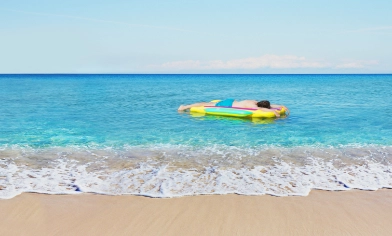
Satisfy your travel craving while making your holiday budget go further. We’ve ...
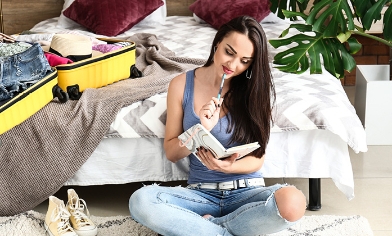
Whether you’re heading to the beach for a much-needed break or boarding a boat ...
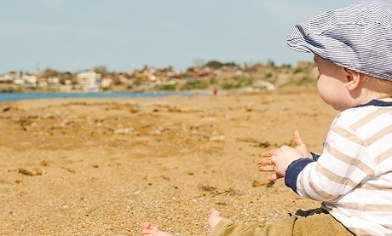
Enjoy that precious time away with your grandchildren, and take some of the ...
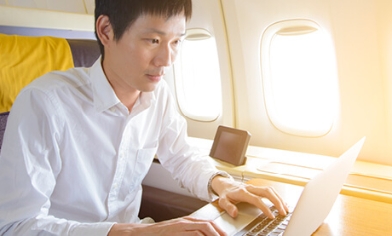
There are several ways to get to the top of the class on your flight – whether ...
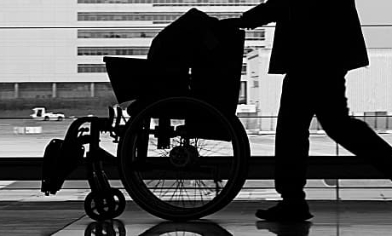
Lots of people who need assisted travel at airports are missing out simply ...
Passport Articles | Childrens Passports
Baby's first UK Passport, what you need to know.
Applying for your babies' first passport is a straight forward process, but there are a few additional things to consider in certain circumstances. For example if the child is only a young infant or has been born either abroad or has one or more parents that do not hold a current British passport, there may be additional documentation and/or information you will need to provide, please see below for more information relating to first child passports:
Who can apply
• If your child is under the age of 16 • If you legally have 'parental responsibility' for them as a biological parent, adopted parent or guardian • They are a British citizen, either through birth or naturalisation through parent(s) You automatically have parental responsibility if you: • Are the child's mother • Are the child's father and are either (present on the birth certificate or married to the child's mother) • Were married to the child's mother when the child was born (or, in Scotland, when the mother became pregnant) • Have adopted the child (alone, or jointly)
Proving nationality
To enable you to get your child's first UK passport you must first prove that they are eligible for British nationality; this can be done by providing a full British birth/adoption or naturalisation certificate for the child. If either of the child's parents are British citizens with UK passports then you can simply include the details for your passports on the child's application. If neither of you were born in the UK nor do you have British citizenship it's worth noting that the process will be different, and you will need to apply to the Home Office for naturalisation of your child before applying for a first British Passport.
Countersigning
In 2007 it became necessary for your child's passport to also be countersigned. This is considered someone who knows both the parent and the child and can certify that the picture is a good likeness to the child. If you are not familiar with someone who can do it, each passport application pack contains a helpful guide book which has a handy list of people who qualify to countersign, you can also review this via our countersigning article .
Passport Photographs
Your child's photograph • Children must be the only one present in the photograph. • Babies must not be holding toys or using dummies. • Children under 6 years old do not have to be looking directly at the camera or have a neutral expression. • Children under 1 year old do not have to have their eyes open. If their head is supported by a hand, the hand must not be visible in the photo. Tips for babies • Lay your baby down on a white sheet • Position you're your digital camera direct above the baby - this stops you having to support the baby's head a neck while also getting a clear shot of your baby • Use a toy directly behind the camera to try and keep your baby's attention • Take plenty of pictures in quick succession - this allows you to look through them and pick the most appropriate one
What documents to include
Birth Certificates When applying for any first time passport you will need to include the child's full birth certificate with your passport application (this must be the full version showing parents details, the shortly abbreviated version will be rejected). Please note that the Passport Office also does not accept copies, the documents provided must be originals. (Please note that if you are just renewing your child's passport a birth certificate is only required if the passport has been lost or stolen). If you need a replacement birth certificate you can get one online at gro.gov.uk or contact your local registry office. Parent Documents Parents are only required to provide additional documents if: One or more of the parents does not currently hold a British Passport (The parents must then provide original foreign birth certificates or a passport to prove identity) If a parent's name is different to the name shown on the full birth certificate of the child. (The parent in question must provide either an original marriage certificate or deed poll confirmation to prove the legal name change).
What are the timescales & costs?
A first time child passport costs £46.00 for standard postal service (4-6 weeks) and £87.00 for fast-track one-week service (this requires an appointment at a local office ). The premium one-day service is not available for first time child passports as there is more paperwork to process so please leave yourself plenty of time when applying for your child's first passport.
Need more help?
Talk to the Passport Office team
Lines open 8am-8pm
Need an urgent appointment?
Send this link to a friend

Travel advice
Travelling with a baby takes careful planning in order to minimise any disruption to your baby’s routine and can help contribute to a more peaceful and relaxing holiday.
Planning ahead
It is worth taking time to consider what items you might need to take on holiday and what precautions you will need to take in order to protect your baby’s health and safety whilst you are away from home.
Travel tips
- Make a list of essential items you will need to take with you. This will include items such as car seat, travel cot, baby food and first aid kit.
- Your first aid kit should include items such as paracetamol suspension, ibuprofen suspension, barrier cream, thermometer and rehydration sachets.
- Baby formula milk if you are formula feeding.
- If you are travelling abroad and formula feeding familiarise yourself with the guidance on how to safely prepare your baby’s formula milk whilst away. You need to boil the tap water.
- If you are travelling and do not have access to tap water then you will have to use bottled water to make up your baby’s infant formula milk feeds. To do this safely you must read the label to make sure that:
- The sodium level (written as Na) is less than 200 milligrams (mg) per litre
- The sulphate level (written as SO or SO4) is less than 250mg per litre.
- Remember that bottled water is not sterile so would still need to be boiled before using it to make up your baby’s formula feed.
- Consider how you will be sterilising your baby’s feeding equipment whilst you are away.
- If travelling abroad make sure you take precautions with the foods that you offer your baby. Ensure that the food you feed your baby is cooked thoroughly, and has not been left to stand. Avoid giving your baby salad foods or uncooked and raw foods to minimise their risks of becoming unwell. Avoid shellfish whilst abroad.
- Essential travel documentation such as passports, European Health Insurance Card and travel insurance. Remember your baby will need a passport if you are going abroad.
- If you are flying, check with the airline that you are flying with as you may also need a doctor’s letter if your baby is under 2 weeks of age confirming they are able to fly.
- To minimise pain in your baby’s ears, feed your baby or offer them a dummy to suck on when taking off and landing.
- Make sure your baby’s vaccines are up to date and ask your GP if they need any additional vaccines depending on your country of destination.
- Be sun safe and make sure that you protect your baby from the harmful effects of sun exposure. Use a sunscreen appropriate for your baby with a sun protection factor of at least 30 and at least 4 star UVA protection, wide brimmed sun hat and sunglasses but make sure they have the CE mark and British Standard Mark.
- Keep your baby out of the sun as much as possible. Babies under the age of 6 months should not be in the sun at all and babies over the age of 6 months should be kept out of the midday sun between the hours of 11am and 3pm.
- Offer your baby regular fluids to prevent them from becoming dehydrated. Your baby will not need additional fluids if you are breastfeeding. However, if you’re formula feeding or weaning your baby then you could offer your baby cool boiled water to prevent them from becoming dehydrated.
- Ensure you have a car seat that is appropriate for your baby if you are planning on hiring a car whilst you are on holiday and that you know how to fit it properly.
- If travelling for long periods of time ensure that you stop and have regular breaks and take your baby out of their car seat and allow them time to lay flat.
- Be aware of the risks that your new and unfamiliar environment may pose to your baby and your family such as tiled floors, steps and blind cords.
- Familiarise yourself with the fire exits.
- Consider the risks presented by open water such as swimming pools and the sea and never leave your baby unsupervised.
If you are worried or require any further advice about travelling with your baby please do not hesitate to speak to your Public Health Nurse (Health Visitor), GP or Practice Nurse.
Useful information
Fit for Travel NHS - travelling by plane
NHS - keeping your baby safe in the sun
NCT - baby and toddler travel: what you need to know before going ahead
Accessibility tools
- Increase text size
- Decrease text size
- Reset text size
- Black and white
- Blue contrast
- Beige contrast
- High contrast
- Reset contrast
UK Edition Change
- UK Politics
- News Videos
- Paris 2024 Olympics
- Rugby Union
- Sport Videos
- John Rentoul
- Mary Dejevsky
- Andrew Grice
- Sean O’Grady
- Photography
- Theatre & Dance
- Culture Videos
- Fitness & Wellbeing
- Food & Drink
- Health & Families
- Royal Family
- Electric Vehicles
- Car Insurance Deals
- Lifestyle Videos
- UK Hotel Reviews
- News & Advice
- Simon Calder
- Australia & New Zealand
- South America
- C. America & Caribbean
- Middle East
- Politics Explained
- News Analysis
- Today’s Edition
- Home & Garden
- Broadband deals
- Fashion & Beauty
- Travel & Outdoors
- Sports & Fitness
- Sustainable Living
- Climate Videos
- Solar Panels
- Behind The Headlines
- On The Ground
- Decomplicated
- You Ask The Questions
- Binge Watch
- Travel Smart
- Watch on your TV
- Crosswords & Puzzles
- Most Commented
- Newsletters
- Ask Me Anything
- Virtual Events
- Betting Sites
- Online Casinos
- Wine Offers
Thank you for registering
Please refresh the page or navigate to another page on the site to be automatically logged in Please refresh your browser to be logged in
Is your child’s passport valid for travel?
Article bookmarked.
Find your bookmarks in your Independent Premium section, under my profile

Sign up to our free Brexit and beyond email for the latest headlines on what Brexit is meaning for the UK
Sign up to our brexit email for the latest insight, thanks for signing up to the brexit and beyond email.
After the Home Office ’s defective “online passport checker” ruined family holidays by generating absurd “false negatives”, these are the actual rules to help you understand if your child’s passport is valid for travel – and the steps you can take if it is not.
How do I know if my child’s passport is valid for a trip to the EU?
Before Brexit , every British passport was valid in the European Union up to and including the date of expiry. The decision to leave the EU means the UK has decided to become a “third country” for which passport rules are more complicated. But not by much.
The only test for a child’s passport: is it valid for at least three months after the date they intend to leave the European Union country they are visiting?
Therefore for a family holiday in Spain, Portugal, Italy or Greece that ends on 15 August 2021, a passport will need to valid until at least 15 November 2021.
Is that it?
Yes, with one exception. For Ireland it is even easier than the other 26 EU nations. No passport is necessary for travel between Great Britain and the republic (though some air and sea carriers may ask you to have one).
But some families have been told their children’s passports are no longer valid?
In some cases that will be true; during lockdown many passports expired or moved into the three-month zone that makes them invalid for travel to the European Union.
In addition, the Home Office online passport checker was programmed to generate many “false negatives”: telling parents their children’s passports were not valid.
After representations from The Independent , the government has taken down the defective website.
Unfortunately, the Home Office continues to publish misleading information such as: “On the day of travel to the EU, Switzerland, Norway, Iceland or Liechtenstein, your child will need six months left on their passport.” This is not true.
Even though the UK government makes this false claim, it does not justify an airline turning your child away if they meet the actual EU condition (“will it still be valid for three months on the day of return?”).
Any airline that wrongly denies boarding must pay cash compensation to the traveller and make good the effects of the decision.
My child definitely needs a renewed passport urgently.
If you have a few weeks to spare, a straightforward online renewal costs £49.
While HM Passport Office is warning renewals are taking up to 10 weeks, The Independent has seen no evidence of straightforward cases taking anything like so long.
According to the crowd-sourced website PassportWaitingTime.co.uk, the current wait is 14 days.
I need it faster than that.
The only option is to use the One Week Fast Track service – which can be used equally to renew a child passport, to apply for a first child passport or to replace a lost or stolen passport for a child.
It cannot be done online. You must get a paper application form from a Post Office and book a personal interview at a passport office (though the child need not attend).
Centres are located at Belfast, Durham, Glasgow, Liverpool, London, Newport and Peterborough. Be warned that availability is very patchy. Looking on 27 July, for example, the first appointment for Liverpool is 5 August.
The cost is £122 for a child passport.
What are the rules on passport validity in other countries?
The default is that it should be valid for the intended length of stay (ie no formal minimum). This is the case for destinations such as Australia, Barbados, Gibraltar, Mexico and the US. Some of the exceptions are shown here.
Thirty days from date of exit: South Africa
Three months from date of entry: Morocco
Three months from date of exit: New Zealand
Six months from date of entry: Cape Verde, Dominican Republic, Egypt, Kenya, Turkey.
Some countries also demand that the passport contains blank pages for their stamps.
Bear in mind that many nations worldwide either won’t accept visitors from the UK right now, or are on the “ red list ” requiring hotel quarantine, or both.
Join our commenting forum
Join thought-provoking conversations, follow other Independent readers and see their replies
Subscribe to Independent Premium to bookmark this article
Want to bookmark your favourite articles and stories to read or reference later? Start your Independent Premium subscription today.
New to The Independent?
Or if you would prefer:
Want an ad-free experience?
Hi {{indy.fullName}}
- My Independent Premium
- Account details
- Help centre

How to Apply For A Babies First Passport In The UK
Love to travel and a first-time parent? The first thing that comes to mind is to find a baby friendly holiday right away with your little one. But what if you are planning an international trip ? This will be a very exciting time for you but you will need to source one very important thing before flying with a baby before you travel – your babies passport! Every British Citizen including infants needs a valid passport to enter and leave a foreign country and here’s how to apply for your babies first!
Table of Contents
How do I apply for My babies first passport?
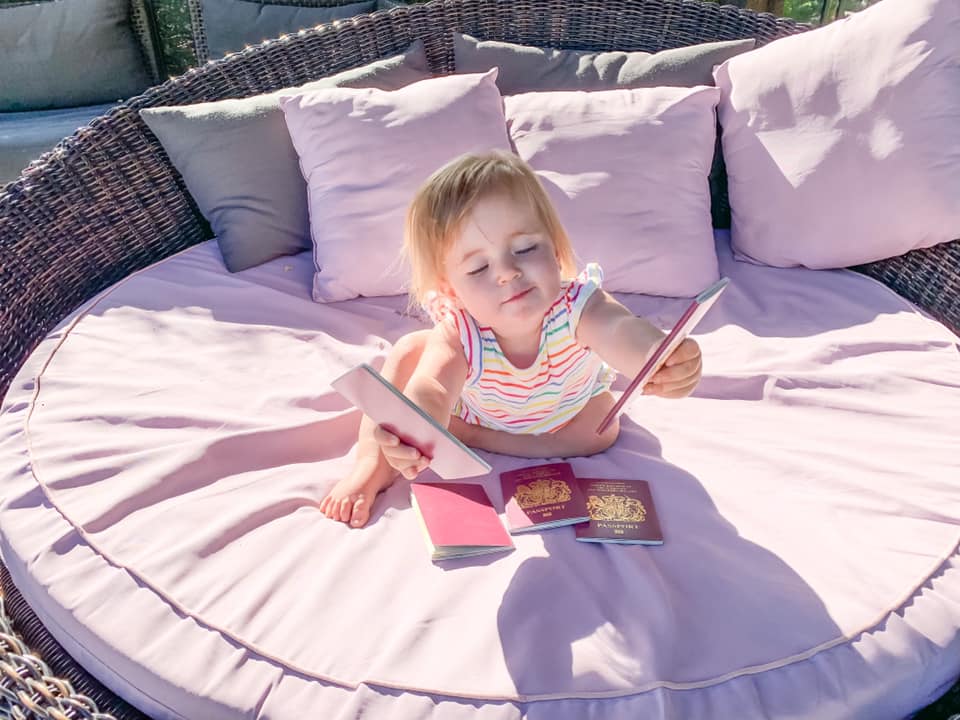
Applying for a first-time passport is easy as long as you follow all of the instructions. There are several documents you need to fill in and this can either be done via a paper method or online.
As I mentioned, there are two steps on how you can apply for your baby’s passport and here’s everything you need to know.
How much will my babies first passport cost?
A passport will cost £46 or £55.75 by using a Check and Send Service.
If the process isthrough the post, documents will return to you by a normal post and if you want a secure delivery you can add an extra £3.
How long will my babIEs passport take to arrive?
It usually takesaround 3 weeks before the passport arrives. (You can also track the status thru online)
Applying for your babies first passport online
Complete the form on the website.
Visit https://www.gov.uk/get-a-child-passport/first-child-passport and start the process by filling in all the details. Make sure you make every detail correctly to avoid delays.
Get a baby passport photo
You will need a Digital Photo of your child, a baby passport photo should be on a white or cream background. Make sure that ears and head are both seen in the shot and baby isn’t wearing a hat or have a dummy in.
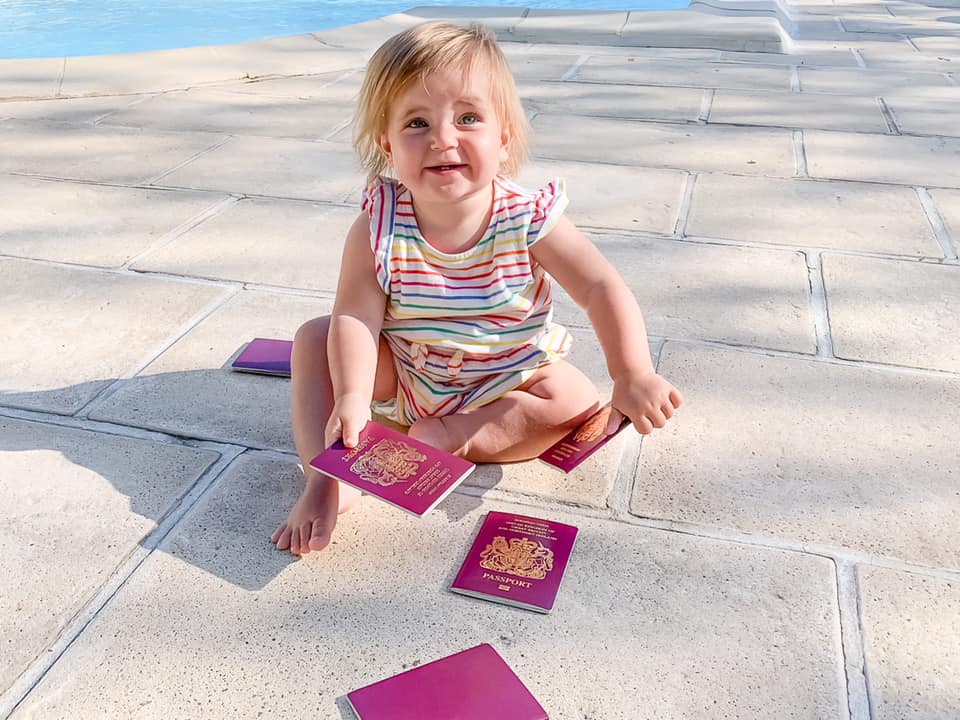
Tips: You can go to a local photographer or pharmacy that offer passport photo services because they know what are the rules on taking a digital photo for the babies. If you prefer to take a photo on your own, you can check the rules and guidelines on how to do it by visiting https://www.gov.uk/photos-for-passports .
Prepare the documents
You can see what is needed through the website while filling out information – follow it carefully.
Prepare credit or debit card, you will need this to pay for the passport.
Get someone to confirm your babies identity
After paying and submitting the application, you will need someone to confirm your child’s identity online. The rules about who this can be are very clear.

.. sit back and wait!
And after the payment and filling all the information needed, you just need to wait for your passport to arrive.
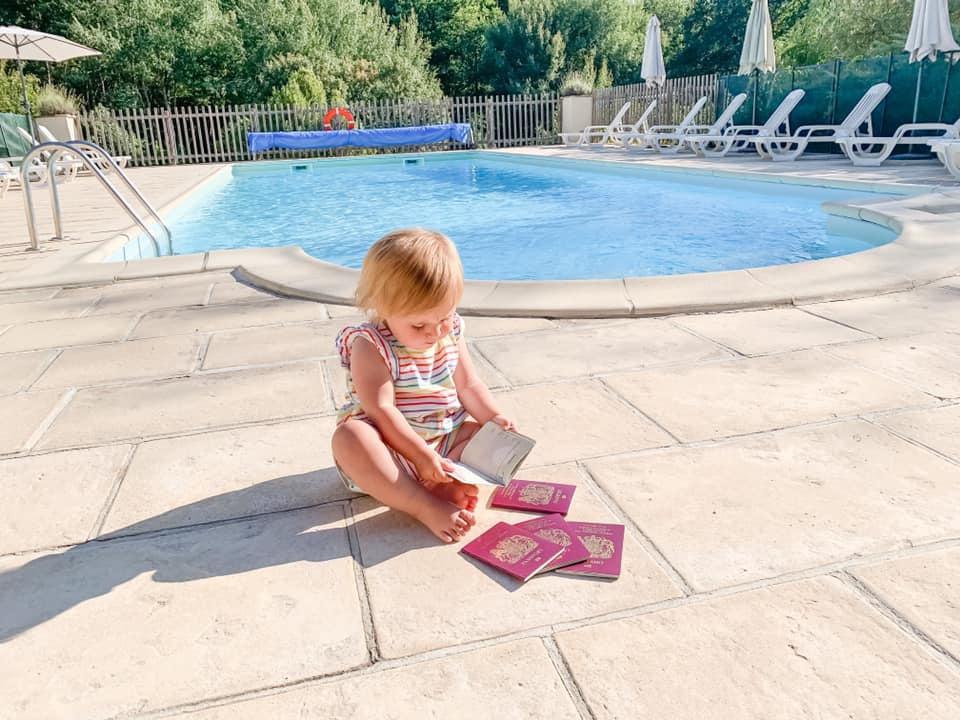
How to apply for babies first passport By Post
Get a paper form from the post office.
Check if they offer a Check and Send Service. Or you can contact Passport Advice line and they post the form to you.
A section 1,2,3,4,5and 9 should be filled out by the parent and someone to fill in section 10 to confirm your baby’s photo. They are known as your counter signatory.
You will need two printed photos, your child’s full birth certificate and proof that your baby has British nationality. If supporting documents are needed, this should be an official copy.
Send back via post
You can send the application by posting using the pre-printed envelope that comes with the form or taking it to the post office if you use to check and send service.
… sit back and relax!
It is now time for you to wait for your babies new passport. It will be sent to you by a courier or royal mail and a signature required.
If you are considering your first holiday with a baby, you may like to take a look at some resorts that offer creche facilities too, or read about what to pack in your carry on bag with a baby or what to think about when flying with a baby . Don’t forget it’s your holiday as well!
GO ON, PIN IT!

2 thoughts on “How to Apply For A Babies First Passport In The UK”
Such good tips in here. I have a few friends who need to get their baby’s passport soon so I’ll be sure to share.
Pingback: Travel Document Checklist- ESSENTIAL papers you NEED to carry in 2020
Leave a Comment Cancel Reply
Your email address will not be published. Required fields are marked *
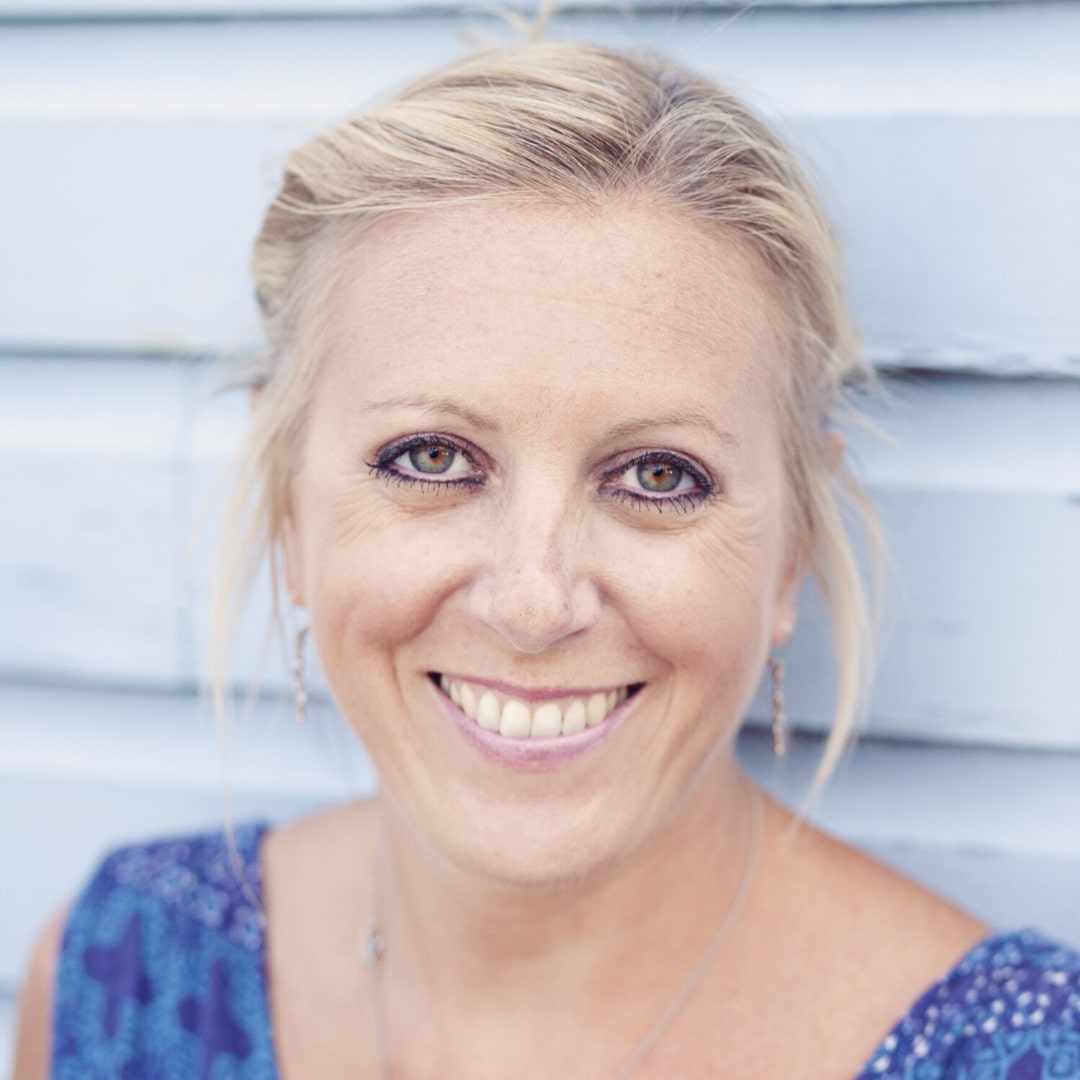
Hi, I’m Anna, a travel loving wife to Tristan and Mother to 6 year old twins Poppy and Tabitha, their 3 year old sister Matilda, and together we are Twins and Travels.
Search here for ideas:
Signup for news and special offers!
You have successfully joined our subscriber list.
Booking.com:
Recent articles:.

Three stunning destinations in the Indian Ocean to enjoy a truly luxurious getaway
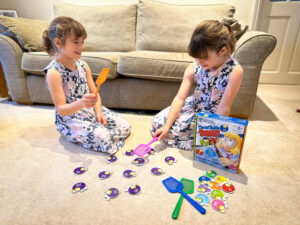
How to help your child in Year 3 – Starting Key Stage 2
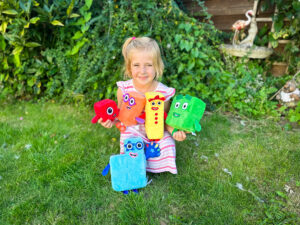
Engaging Children in Learning with Numberblocks
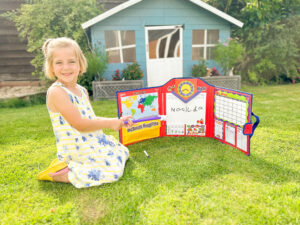
How to Prepare your Child for Starting School 2023
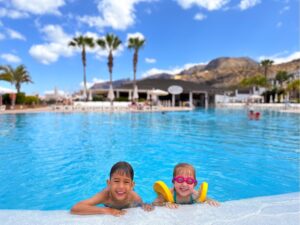
Landmar Costa Los Gigantes – A Great Family Hotel in Tenerife (2023)

Efteling Theme Park Review 2023 – A Magical Family Attraction in The Netherlands
Support this site with affiliates:.
Twins and Travels uses affiliates. They are also a participant of the Amazon EU Associate Programme and they earn from qualifying purchases. Use this affiliate link to search for and purchase from Amazon and they will make a small commission. It does not affect how much you pay.
Trustpilot 4.8/5 based on 15,882 reviews
Flying with Baby: Useful Tips and Everything Parents Need to Know
Check your claim for compensation online now in just 2 minutes
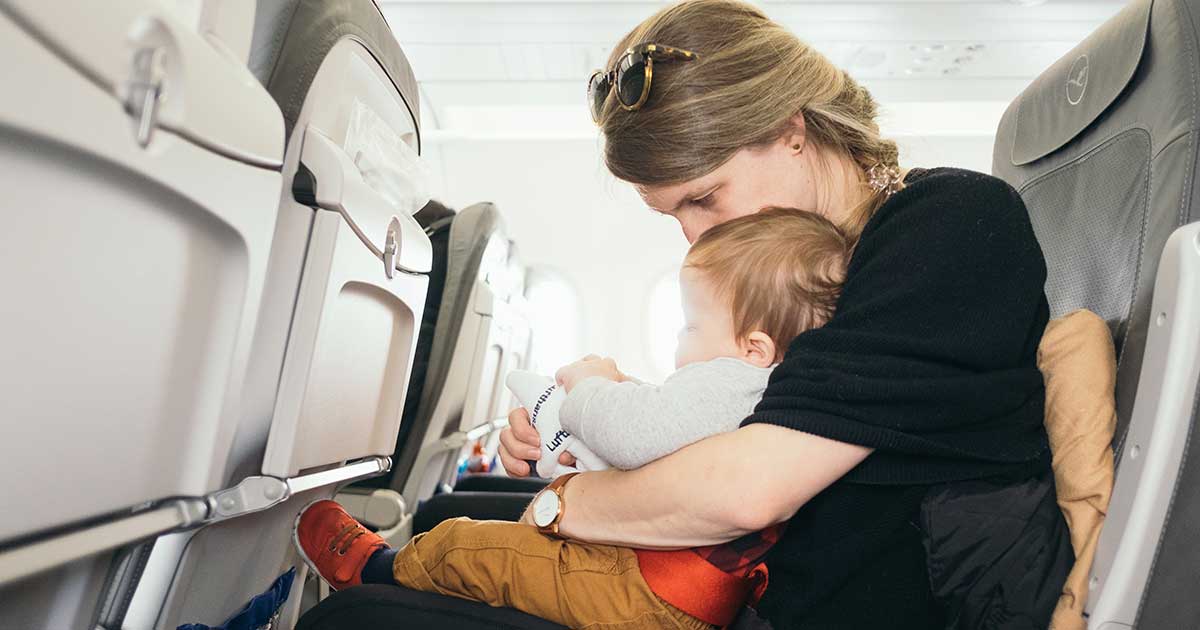
- Family Travel
How do I apply for a baby’s passport?

- The Travel Mum
Applying for a baby’s first passport can feel daunting. If like us you plan to travel soon after birth, you will be wanting to apply as soon as possible. Not easy when you’ve just given birth and are adapting to a new family life! Luckily for us it is quite a simple process.

Your Baby’s Passport Application Made Easy!
When do i need to apply.
Your baby will need a passport to travel from birth. If you have no intention of travelling for some time then there is no need to rush into this. The passport only lasts 5 years, so don’t bother getting one until you need it. If you have a trip lined up for after the birth, you will want to consider whether you will do a routine application or a fast track one.
How long does it take to get a baby’s passport?
A fast track passport will be available within a week. This is the process we did with Leo as we were flying soon after his birth (how cute is he above with his first passport!). We also plan to do this when our second son is born in May, as we have a trip planned for July. The passport office currently says a routine application will take up to 3 weeks, but can be longer.
How much does a new baby’s passport cost?
A new baby or child passport applied for routinely online currently costs £53.50. (It is cheaper to apply online than by post).
If you want to use the fast track service it is currently £126 for a baby / child’s passport.
How do I apply for a new baby’s passport?
If you want to use the fast track service you can start the process here.
If you want to use the routine service you can start the process here.
What documents do I need to apply for a new baby’s passport?
- Birth (or adoption) certificate. If you are in a rush make sure you apply for this asap. A lot of places will allow you to pay a fast track fee to receive the birth certificate faster.
- Two passport pictures of your baby / child.
- Proof of British nationality.

How to take a baby’s passport photo?!
A lot of parents get nervous about this, but the rules for babies and small children are quite lenient.
Use a plain background
- no texture or patterns
- children must be on their own in the photo
- babies must not be holding toys or dummies
- Top Tip: Lay your baby on a white sheet with something supporting their head UNDER the sheet. Take the photo from above.
Children under 1:
- you can support their head with your hand if you want but your hand must not be visible in the picture.
Ensure even lighting
- There cant be any shadows in the picture
- Use natural day light for the best results. Position yourselves near a window.
Plain expression and face in full view (for children)
- face front on to the camera
- no smile or frown – eyes open and mouth closed
- your child’s photo should be a good likeness and taken in the last month
Children under 6 and babies:
- don’t have to look directly at the camera
- don’t need to have a plain expression
Can I book a flight for my unborn baby?
No you can’t. The baby will need a DOB and official name to book the flights. We currently have some flights booked for trips we plan to take the baby on, even though he hasn’t been born yet. We have spoken to Ryanair, BA and easyJet and the rule seems pretty consistent. Essentially you pay a ‘lap price’ to travel with your baby (the baby wont have their own seat until they are age 2). This can be added onto the booking as soon as you have the required information post birth.
I will update you on how this goes in July!
Need to renew a passport for your child?
Recent posts.

How to Hire a Car Abroad
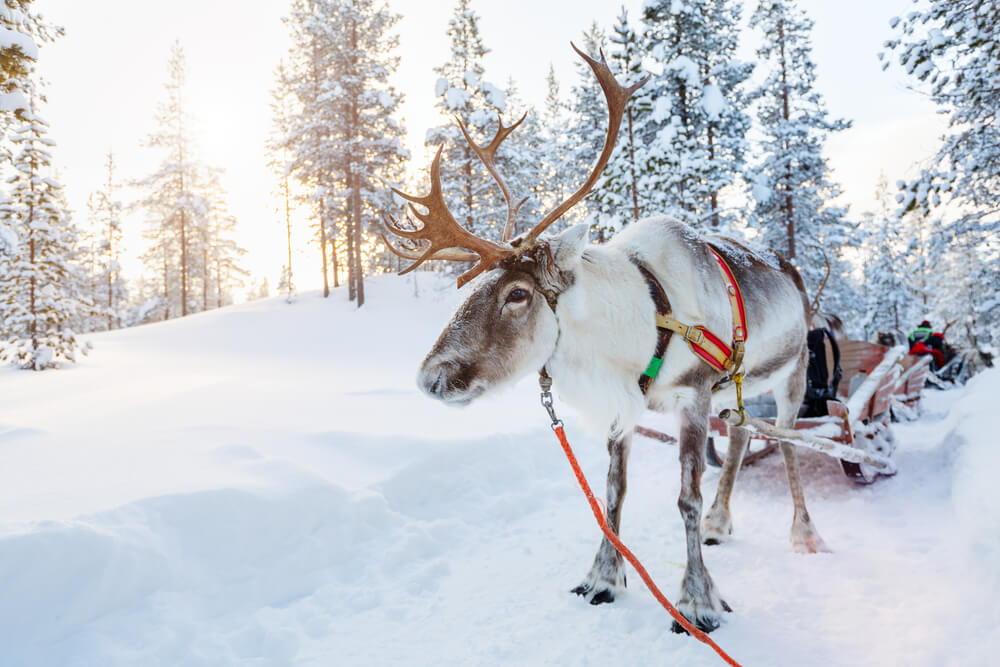
Lapland on a budget: A complete guide
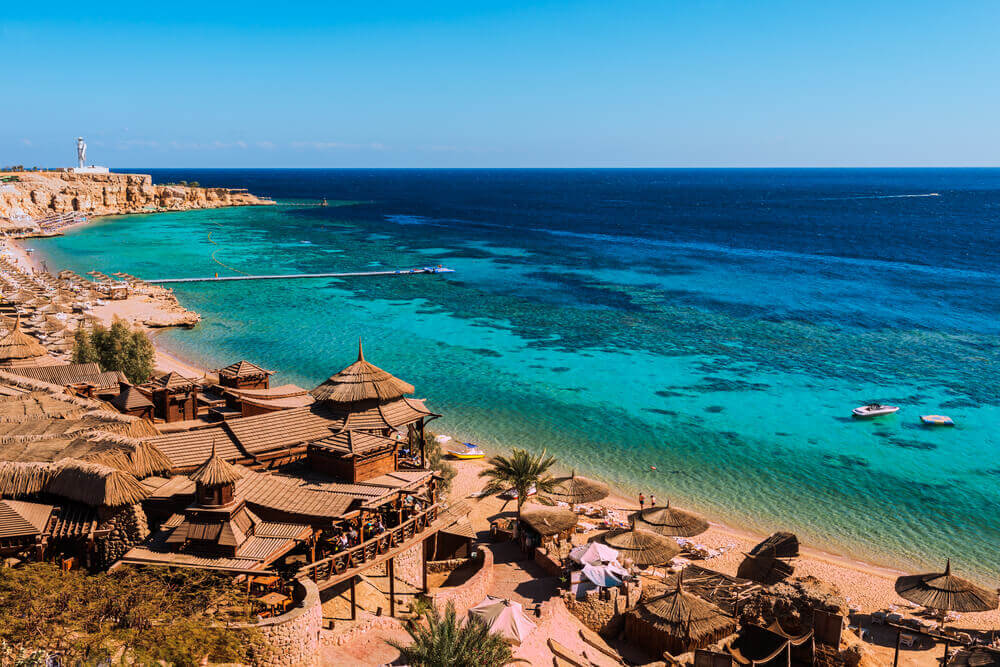
How safe is Sharm el Sheikh?
- Trying to Conceive
- Signs & Symptoms
- Pregnancy Tests
- Fertility Testing
- Fertility Treatment
- Weeks & Trimesters
- Staying Healthy
- Preparing for Baby
- Complications & Concerns
- Pregnancy Loss
- Breastfeeding
- School-Aged Kids
- Raising Kids
- Personal Stories
- Everyday Wellness
- Safety & First Aid
- Immunizations
- Food & Nutrition
- Active Play
- Pregnancy Products
- Nursery & Sleep Products
- Nursing & Feeding Products
- Clothing & Accessories
- Toys & Gifts
- Ovulation Calculator
- Pregnancy Due Date Calculator
- How to Talk About Postpartum Depression
- Editorial Process
- Meet Our Review Board
Does My Infant Need a Passport?
Tetra Images / Getty
- Infant Passport Requirements
- How to Apply
What to Bring With You
What comes next.
If you're planning an international trip with your infant soon, you may be wondering if your infant will need a passport to travel and what other rules and regulations you need to be aware of. Here's what you need to know about traveling internationally with a baby, including if you need an infant passport, what rules apply to travel with a newborn or infant, and how you can prepare.
Do Infants Need a Passport to Travel?
The short answer is yes.If you will be traveling internationally between countries, your infant will most likely need a passport in order to leave your home country and re-enter it. There are some exceptions to the general travel rule, however, such as traveling from the U.S. to Canada.
Minors under the age of 16 traveling from the U.S. into Canada are not required to have an official passport and only need their birth certificate as an official document to enter and exit the country.
If you are planning to travel to most places outside of your home country with an infant or any child under the age of 16, however, you will need to plan to obtain a passport for everyone you are traveling with before you go—including your child.
How to Apply for an Infant Passport
You will need to apply for your infant's passport in-person; parents and caregivers cannot apply for an infant passport over the phone, via mail, or online at this time. As an adult, you may have the option to apply for a new or renewed passport via mail or in some states online for yourself, but for infants, you will still have to visit an acceptance facility in your area.
You can search the U.S. Department of State's Travel website to find a passport acceptance facility near you. In many situations, your local post office may also be able to perform passport processing, although you will want to verify that before you go.
Some passport processing facilities will also require that you make an appointment ahead of time to apply for a passport, so be sure to check the rules and schedule an appointment if your facility requires it. And, lastly, if you need your infant's passport very quickly, you will have to visit an expedited passport processing facility and be prepared to pay an additional fee (around $60) to get the expedited passport.
The main application for an infant passport is Form DS-11.
As of March 2020, Forms DS-11, DS-3053, and DS-5525 are expired, but according to the U.S. Department of State, parents may continue to use these forms to apply for passports for children under 16 years of age. The DOS will post updated versions of the form online when available.
Form DS-11 has to be completed in person for all first-time passport applicants, including minors and infants. You can print out a copy of the PDF version of the form on the U.S. Department of State's Travel website or use the online form generator to fill it out in your computer browser as well, then print it out.
If you choose to pre-fill the form, however, you should not sign the application until you are in the office in-person applying for the passport. The form is two pages long and fairly straightforward to fill out with your personal information.
If you plan on traveling frequently with your baby, when you apply for the passport, you can mark the checkbox "Large Book (Non-Standard)" at the top of the form to request a larger passport with more pages.
Before your appointment to get your infant a passport, assemble everything you need to bring. The last thing you want to do is wait in line with your baby to get a passport only to have to do it all over again because of a missing document. Here's what you need to bring with you:
- Your baby's official birth certificate : You will need the official birth certificate and, as a safeguard, you may want to bring along a digital back-up and a photocopy of the original as well.
- Proof of U.S. citizenship : If you are traveling fairly soon after your baby's birth, you may not have your infant's official birth certificate yet. In that case, you can try calling the local county clerk's office to see if it is possible to expedite the process or if they have any recommendations for a verified form you can get instead. If your child does not have a U.S. birth certificate, the forms of Consular Report of Birth Abroad or Certification of Birth or a Certificate of Citizenship are also allowed to be used. In some situations, there are different documents that can be used as proof of citizenship, including family or religious records, such as doctor forms, baptism announcements, or even personal registers. You can also use a prior U.S. passport, even if expired, as proof of U.S. citizenship.
- Your baby's social security number : Again, if your baby doesn't have a Social Security number yet, which can take weeks after birth as well, you can still apply for a passport according to the U.S. Department of State by providing a signed and dated statement that says, “I declare under penalty of perjury under the laws of the United States of America that the following is true and correct: (Child's full name) has never been issued a Social Security Number by the Social Security Administration.”
- All legal parents : If one of the legal parents is unable to apply in-person for the passport, that parent will be required to fill out an absentee form Form DS-3053, if applicable. If you are the only legal guardian of your child, you will also need to bring documentation proving that fact, such as a birth certificate with only your name on it, or a court order granting sole guardianship. In addition to being physically present, both legal guardians must also bring their own form of proof of identification and citizenship, such as an in-state, valid driver's license, a valid or expired, undamaged, U.S. passport, a Certificate of Naturalization or Citizenship, a Government employee ID, military ID, current foreign passport, or Matricula Consular. In some cases, if neither parent is available to appear with the infant, a third-party may be able to apply for the passport for the infant.
- A passport photo : There are very specific rules surrounding passport photos for infants. The U.S. Department website advises parents to either place the baby down a plain white sheet for the photo or line a car seat with a white sheet or blanket before taking the photo. The infant should be facing the camera and no one else can be in the photo. You should bring the photo, but don't staple it or attach it to the passport form application.
- Photocopies of everything : In addition to bringing the original proof of citizenship, you have to bring an 8 x 11, plain black and white photocopy of all documents , your own ID included, that you are providing. The photocopy stays with the application and while it is officially not required, if you don't provide it, it will delay the passport processing. If you don't bring a photocopy, you will also need a secondary proof of U.S. citizenship. No photocopy can be double-sided.
After you pay your passport fees (the cost is around $115 for normal processing), you will receive the infant's official passport in the mail. Seven to 10 days after you've completed the application, you can track the status of your child's passport application online or by calling.
Once you have your passport for your infant and yourself, you can see the world together! Your little one's passport is only good for five years, so you will need to be sure to update it or apply for a new one after that.
A Word From Verywell
If you will be traveling with an infant out of the country, your baby will most likely need their own passport in order to be granted entry to and exit from a new country. All infant passports have to be applied for in-person, so be sure to plan accordingly before your travel dates. We know that traveling with an infant, especially for the first time and to a foreign place, can be stressful for a lot of parents.
With a little extra preparation to ensure your baby has their passport, you can help make the travel process as smooth as possible—and help your little one get that first stamp on their passport.
U.S. Department of State – Bureau of Consular Affairs. Frequently asked questions: children under 16 .
U.S. Department of State – Bureau of Consular Affairs. Canada international travel information .
U.S. Department of State – Bureau of Consular Affairs. Get my passport fast .
U.S. Department of State – Bureau of Consular Affairs. DS-11 U.S. passport application .
By Chaunie Brusie, RN, BSN Chaunie Brusie is a registered nurse with experience in long-term, critical care, and obstetrical and pediatric nursing.
Tickets and travel documents
There’s a lot to think about when travelling with a family, from making sure everyone’s passports are valid (despite having checked it one hundred times already) to knowing what ticket to buy for your different aged children. Luckily, we’re here to help you from the moment you book until the moment you land.
Passports, visas and other documentation
Please check with the IATA Travel Centre that your passports an d other travel documents are valid for your whole journey, before you travel.
Some countries' immigration departments require additional documentation for any children under 18 years of age, (whether they are your children, your grandchildren or children of friends,) who are travelling into, out of or transiting their country. The extra documentation that you may require varies by country and changes regularly so please check the country's embassy website for more information.
The IATA Travel Centre can advise you which documents are required for each country you’ll be visiting or transiting. Enter your child’s date of birth so that the extra requirements are displayed.
Tickets for infants, children and young adults
These are the age categories we use when you make a booking with us:
Infants: 0 - 23 months Children: 2 - 11 years Young adults: 12 - 15 years Adults: over 16 years
When traveling with your infant (under 2), you have two ticket choices:
- Your infant sits on your lap. You’ll pay an infant fare, which is a percentage of the adult fare.
- Your infant sits in their own seat. You’ll pay a child fare for this ticket. The infant must travel in an approved car seat or AmSafe System that fits into the aircraft seat securely.
If you’d like your infant to have their own seat, or to add your infant to an existing booking, please contact us and we'll be pleased to help you.
Once your little one turns 2 years old, they'll be considered a child and will need to travel in their own seat. You'll need to book and pay for a Child fare.
All children under 14 years must travel accompanied by an adult aged 16 years or over. Anyone under the age of 14 won't be allowed to fly unaccompanied.
Young adults
We allow children aged 14 or older to travel alone with us on domestic or international British Airways flights. All children aged under 16 travelling alone must carry a printed copy of:
- A completed parental/guardian consent form
- Photographic identification of the parent/guardian who completed the form showing their signature
Parents or guardians can download the consent form and once completed, print it out along with a copy of their current passport or another form of photographic identification showing their signature.
Booking with partner airlines
If your journey involves travelling with one of our partner airlines, their rules for infants and children may be different and will apply. Please check the airline’s website or call your local British Airways office for the correct information.
Infants who become children while travelling
If you're travelling with an infant who reaches the age of 2 during their journey, your child will need their own seat for any flights on and after their 2nd birthday. We won’t charge you extra; you'll only pay the infant fare for the entire journey.
This booking can't be made online, so contact us and we'll be pleased to help you.
Making a booking for an unborn infant
If you know you want to travel shortly after you’re due to give birth, you can make your own booking as usual. Please contact us after your baby is born and we’ll arrange for your baby’s ticket to be issued. You must always have a ticket for your infant's journey.
Newborn babies must be at least 48 hours old and have been born without any complications before they can travel with us. However, we recommend waiting until the baby is one week old. If you plan to fly soon after your baby's birth, please check with your treating doctor it's safe for both you and your baby to travel.
If you had a Caesarean section or other surgery was needed during or after the birth, you can travel 10 days after, with medical clearance from our Health Services. We would advise that your treating doctor approve your travel first.
Booking a child into a different cabin
You can book your child to travel in a different cabin from yourself. Just make your booking first, then contact us to make a separate booking for your child.
Children between 5 and 12 can be booked into a different cabin from you.
Children under 5 must travel with someone over the age of 16.
If you're a Gold or Silver Executive Club Member, your child can come with you into the lounge as your eligible guest, regardless of the cabin you're travelling in.
You should board the aircraft as a family, with your child. Once on board, your child will be directed to their seat in the cabin that they are booked into.
You, as the child’s parent or guardian, will be responsible for their health, wellbeing and behaviour, both on the ground and on board. Please ensure that your child understands that they must follow crew instructions at all times and make sure they have any necessary items with them before boarding as it may not always be possible for you to visit them during the flight.
Should your child need any assistance during the flight, you'll need to voluntarily downgrade to the same cabin as your child. We're unable to upgrade your child to the cabin you’re travelling in.
Travel documents for kids
When travelling with your children, most likely you need to bring some additional travel documents. Make sure to check what applies to your family.
Which documents
Which travel documents you need to bring for your kids, depends on a couple of factors:
- your country of departure, transfer, and destination;
- your nationality;
- your country of residence.
We advise checking the embassy website of the country you’re visiting. For detailed information suitable for your trip, check our travel documents tool.
Passport or ID card
Children of European Union citizens travelling from, to or via EU countries need to carry their own passport or ID card. Having their names entered in their parent’s passports is no longer permitted. This restriction does not apply to document holders of the United Kingdom or Ireland.
Consent form for minors
Is your child travelling alone, with only 1 parent or guardian, or with an adult that does not have parental authority? Before going through security control, you’ll have to complete a consent form.
Birth certificate
Does your child have a different last name than you? Please bring the family booklet or birth certificate to prove your connection.
Extra documents for specific destinations
You might need to bring various additional documents for your child for specific destinations. You’ll find detailed information about all destinations in our travel documents tool.
All children younger than 18 years and travelling to Barbados without a parent or legal guardian need to bring a letter of authorisation from their parent or legal guardian. This letter should specify who will pick them up at Grantley Adams International Airport in Barbados. It is a mandatory addition to the forms required for the Unaccompanied Minor service.
When travelling alone, their parent or legal guardian need to submit a request to the Chief Medical Officer (CMO) via [email protected] .
Read more about the documents needed for Barbados
For travel to and from Brazil, all children born in Brazil need to bring several documents, regardless of whether they travel with both parents, 1 parent, an accompanying adult, or alone.
Read more about the documents needed for Brazil
South Africa
For travel to and from South Africa, some children require special documentation: children with the South African nationality and children of any nationality travelling as unaccompanied minors.
Read more about the documents needed for South Africa
Read more about
Travelling with kids.
Get a glimpse of what your kids can expect during their flight.
Ticket options for kids
Travelling with your child? Find out which ticket option is available for your little one, depending on their age.
Children travelling alone
You need the Unaccompanied Minor service for children between 5 and 14 years old who are travelling alone.
MORE SECTIONS
- Dear Deidre
MORE FROM THE SUN
- Newsletters
- Deliver my newspaper
- Sun Vouchers
- The Sun Digital Newspaper

Do babies need a passport to travel from the UK?
- Daniel Nuttman
- Published : 9:28, 8 Feb 2023
- Updated : 21:16, 8 Nov 2023
FAMILIES with newborn babies may be eager to take their child on a first holiday.
However, what you may not realise is that if travelling abroad, they will need a passport in order to confirm their identity. Here's all you need to know.

Can newborn babies travel without a passport in the UK?
Everyone who is travelling abroad needs a passport , even very young babies.
A child passport is valid for five years.
The Passport Office states it should take three weeks to get a passport, or one week if you use the fast track service.
What documents do you need to get your baby their first passport in the UK?
You will need two suitable passport photos of your child.
READ MORE ON TRAVEL

Rules around travelling to Jersey from the UK and whether you need a passport

A look at what ID is required on UK domestic flights
They must be on their own in the photo and not holding anything.
If your child is under six years old, they do not need to be looking directly at the camera or have a plain expression, as any parent will know this can be very difficult to achieve.
Children under one should be placed lying down on a plain light-coloured sheet with the picture taken from above.
To apply for a first passport you will also need their full birth or adoption certificate, proof of British nationality, and any information regarding court orders.
Most read in Travel

Struggling UK airport to welcome new easyJet base with 6 new flight routes

New Med holiday destination to be huge with Brits, according to TUI boss

'Desperate' airlines face summer flight cancellations due to plane shortage

Little-known way you can save over £800 on your Center Parcs holiday this year
How to apply for a first child passport in the uk..
Someone with parental responsibility for the child must apply for the passport if your child is under 16.
You can apply for it online or by post.
To submit an application online, go to the government website and fill in all the details.
You will receive information on which documents are required and if you need someone to confirm your child's identity.
From February 2, 2023, it costs £53.50 to apply online and £64 to apply with a paper form from the Post Office .
You need to give both parents’ details when you apply.
If you cannot provide the other parent’s details, you need to say why (for example, you’re the only parent named on the birth certificate or you adopted the child on your own).
When submitting by post, someone with parental responsibility will need to sign the form for children under 12 years old.
Children aged 12 or will need to sign the form as well.
Do babies under one fly for free?
This isn't necessarily the case.
READ MORE SUN STORIES

Little-known rules could leave parents missing out on free childcare

Neighbours fume over 30ft 'helmet' tree that blocks out light & threatens homes
Parents don't have to buy an extra seat for their child, and can sit them on their lap for the journey.
However, depending on the airline you choose to travel with, there may be charges for the child to take their spot on the plane, even if they aren't on a regular seat.
- Children parenting and family life

Wildlife Wednesday: Say No to the Mow
Big Butterfly Count
Travelling without a passport – what you need to know!
- By Kate Limburn
July 22, 2014
With international travel security measures becoming more stringent every day, I have grown accustomed to taking my passport everywhere with me when I travel. If you were born in the UK and are a UK citizen however, then there are times when travel is possible without a passport – even by plane! For UK citizens waiting anxiously on passports during this busy time of year, this may be welcome news!
Travel within the UK
If you are travelling by aeroplane within the UK (yes – even including Northern Ireland) then you do not need a passport. You will however usually be asked for reliable photographic ID such as a current photographic driver’s license. Children under 16 accompanied by an adult who can vouch for them are not required to hold any id for domestic flights.
I regularly zipped up and down to Scotland as a student using just my driving license and we were not asked for any ID when flying with Roo last year between London and Edinburgh. Please do be aware though that you may be asked for a birth certificate for infants – see more on this below.
Travel within the Common Travel Area
The Common Travel Area is a travel zone made up of the UK, Republic of Ireland, Channel Islands and Isle of Man between which border control checks are relaxed for citizens belonging to and travelling between these countries.
In theory, any of these locations should let in citizens of another member of the Common Travel Area without a passport, although other documents will be required. Each travel company differs as to its exact requirements and some are quite relaxed. Aer Lingus for example, state that they accept a bus pass with photo or photographic work pass as ID and Fly Be accept passports that have expired within the previous two years. On the whole though, airlines require a government issued photographic ID document such as your passport or a driving license.
Children under 16 again do not require photographic ID but do be aware that if you are travelling with an infant on your lap, you may be asked for proof that they are under 2 years old and therefore do not require their own seat. A birth certificate should suffice.
Ferry companies seem to be a little more relaxed in terms of what they accept as ID. We travelled to Jersey last year with Condor Ferries and didn’t need anything for Roo, and our driving licenses were not asked for (although we were waving them about in our hand so maybe that was all that was needed). As well as a driving license, other possible forms of ID include college ID passes, NUS cards, bank cards, birth certificates and utility bills. Irish Ferries even told me they accept photocopies of a drivers license or utility bill!
Children travelling by ferry with a parent or guardian do not require photo id. Some companies such as Stena specify a child will require a birth certificate as ID whilst others e.g. Irish Ferries, say that no ID is required for minors, although you might want to take a copy of the birth certificate in case of any problems. As with airlines, exactly which documents are accepted differs from company to company though.
The only time with ferries you need to be really careful is if you are travelling on a service that stops off within the Common Travel Area but whose ultimate destination is an international port. e.g. travelling to France via the Channel Islands. Some companies require a passport on these kind of routes, even though theoretically you shouldn’t need it.
Travel restrictions are changing all the time so please do not rely on the information here alone – always check what documents are required with your travel operator before setting off, preferably by phone or email. This is true particularly for children as I find the guidelines on this to be often vague on company websites.
Kate Limburn
Permanent link to this article: https://babyroutes.co.uk/travelling-passport/
Related posts

The Great Easter Bank Holiday Getaway
Useful links, 17 comments.
Skip to comment form
- Elizabeth power on January 7, 2016 at 06:50
Hi my mum come from Ireland when she was 17 she wont’s to go back and see her family she is 75 one of her sisters are ill she hasent seen them since they was Young we won’t to take her back but she has no birth certificate because I’m Ireland the the place where they kept them got burnt down years ago so they can not give it her and have no record because it went in flames so we can not get a passport so what can we use or her photo ID she has lost her identy because of this I think the Ireland ambassador should do some thing she’s very upset
- Kate Limburn on January 12, 2016 at 10:05 Author
Hi – I’m no expert in the specifics here but if it were me I’d get in touch with the Irish government and order a replacement copy of the birth certificate. So long as her birth was registered this should be easy enough. Try this website for ordering online http://www.hse.ie/eng/services/list/1/bdm/Certificates/ Unfortunately and for necessary security purposes it is pretty much impossible to do much these days without ID as no doubt she is already aware – not least for travel. Good luck getting it sorted out. You could also try contacting Citizen’s Advice if you have trouble finding a solution through the regular channels.
- Mohamad on September 10, 2016 at 16:12
Hi I have new born baby 7 months only can she travel with me with ferry from uk to France with birth certificate?its really important for me please reply.thanks
- Kate Limburn on September 13, 2016 at 11:47 Author
Hi, the only way you can get the exact details on what you need to travel with your baby is by contacting the ferry company directly. It is normal to need a passport for your children, especially where baby is not travelling under special circumstances e.g. born in another country and returning soon after birth to home country but the ferry company you choose will be able to give you exact details of what they require.
- Mohamad on September 13, 2016 at 16:50
Thanks For your email the problem is she is don’t have live to remain yet.she only got birth certificate.can she travel with birth certificate only?
- Evija on September 12, 2017 at 10:29
Hi,,i’m european and my girls have European passport ,very soon they traveling to Scotland from Northern Ireland ,but passport expired ,can they travel?Appointment available only next year.
- Kate Limburn on September 27, 2017 at 11:18 Author
Hi, You need to contact the company who are operating the ferry or plane service directly as they all slightly differ over what they require. In the UK at least, if you need a passport quickly you can arrange an emergency appointment at fairly short notice. Is it worth finding out if something similar exists for your country or if you can contact the embassy in the UK?
- tino on November 3, 2017 at 02:09
my baby have only birt certificate but i want to flight from angland to north ireland whit my baby
- Kate Limburn on January 31, 2018 at 11:58 Author
Hi – you need to get in touch with the travel company you plan to use for specific details. The information on this page is for general guidance only – requirements change too often and can vary slightly from company to company.
- Delila on January 4, 2018 at 22:43
Hi my husband has french shcangai visa can he treavel to northern ireland with it?
- Kate Limburn on January 31, 2018 at 11:56 Author
Hi – you need to contact your airline or ferry company. Details change often and I am not able to help with specifics. Good luck!
- Shane Dempsey on June 19, 2018 at 14:45
Hia, just to let folks know RYANAIR refused our family carriage on a flight from London to Cork. As we only had a full birth certificate for our new-born baby. I am trying to get this information out to as many people as possible as it was incredibly stressful for us to have to return home and miss his first trip back. RYANAIR do not make this clear so please learn from our lessons. Best of luck. Shane
- Kate Limburn on June 29, 2018 at 12:08 Author
Thanks for the update on this. Yes- airlines and ferry companies do not have to request these items but it is down to them if they choose to do so, especially as travel alerts fluctuate so much. That’s why it’s always best to get in touch with your travel company first. What a nightmare for you. Hope this is useful for others.
- TJ on July 14, 2018 at 10:59
Hi, my mother and younger brother plan to fly back to Ireland from Gatwick to attend a funeral.
My brother does not have a passport only a birth certificate and a few other non photographic documents, he is 17 years old. Will he be able to fly?
- Kate Limburn on July 23, 2018 at 14:12 Author
Hi – you really do need to contact the company you are intending to travel with to check on their latest requirements. Details do vary from company to company. That said, it’s unlikely he would be able to fly without any photographic ID.
- Nazan on May 30, 2021 at 13:01
I am a British Citizen, my baby was born in Turkey this year. Can I take her with me to UK without a passport but only with a local birth certificate ?
thank you & regards
- Kate Limburn on June 3, 2021 at 03:18 Author
Hi, this blog was intended largely for travel within the different islands and nations of the UK when travelling by ferry or plane. You would need to contact the airline or embassy to get information on travel internationally. I wish you well with your travels.
Leave a Reply Cancel reply
Your email address will not be published.
This site uses Akismet to reduce spam. Learn how your comment data is processed .
About Kate…

Determined to combine parenthood with her love of travel and the great outdoors, Kate founded Baby Routes in 2012 after the birth of her first daughter.
Now with reception & preschool age daughters & a baby boy to take on her adventures, Kate continues to test out family friendly walks, share travel tips and put outdoor gear for parents and tots through its paces.
Find a walk near me…
Join me on instagram.
Follow on Instagram
Upcoming outdoor events!

- About Baby Routes
- Terms and Conditions
© 2024 Baby Routes.
Made with by Graphene Themes .
- Northern Ireland Tourism
- Northern Ireland Hotels
- Bed and Breakfast Northern Ireland
- Northern Ireland Holiday Rentals
- Flights to Northern Ireland
- Northern Ireland Restaurants
- Northern Ireland Attractions
- Northern Ireland Travel Forum
- Northern Ireland Photos
- All Northern Ireland Hotels
- Northern Ireland Hotel Deals
- Last Minute Hotels in Northern Ireland
- Northern Ireland
- Things to Do
- Restaurants
- Holiday Rentals
- Travel Stories
- Add a Place
- Travel Forum
- Travellers' Choice
- Help Centre
Passport for children travelling to Northern Ireland - Northern Ireland Forum
- Europe
- United Kingdom (UK)
- Northern Ireland
Passport for children travelling to Northern Ireland
- United Kingdom Forums
- United States Forums
- Europe Forums
- Canada Forums
- Asia Forums
- Central America Forums
- Africa Forums
- Caribbean Forums
- Mexico Forums
- South Pacific Forums
- South America Forums
- Middle East Forums
- Honeymoons and Romance
- Business Travel
- Train Travel
- Traveling With Disabilities
- Tripadvisor Support
- Solo Travel
- Bargain Travel
- Timeshares / Holiday Rentals
- United Kingdom forums
- Northern Ireland forum

children under 16 do not require anything if they are travelling with their parents.
https://www.easyjet.com/en/help/boarding-and-flying/travel-documents-and-information

If you don't have hold luggage, easyJet staff usually don't check ID.
Thank you that’s really helpful!
This topic has been closed to new posts due to inactivity.
- Itinerary help Dublin/Belfast/Donegal 12:26
- Travel with my dog from Cairnryan to Belfast today
- Drinks 14 May 2024
- Live football 14 May 2024
- Giant’s Causeway 221 bus price 14 May 2024
- Live music 12 May 2024
- Belfast hen - Bank holiday May 12 May 2024
- Difficult to find taxi 10 May 2024
- Londonderry and gaunt causeway tour 09 May 2024
- Breakfast en route 09 May 2024
- Golf courses close to the A5 09 May 2024
- 3 nights in Derry 07 May 2024
- Bus tickets Belfast 07 May 2024
- TIme recommendation for drive, prison, and tour 05 May 2024
- Santra Trails 11 replies
- Silvercliffs Holiday Village - Apartment Review 24 replies
- Afternoon tea in Belfast 25 replies
- Belfast to Portrush 10 replies
- places to stay near Giant's causeway 4 replies
- Logwood Santa Trail 4 replies
- Santa in Northern Ireland? 10 replies
- Hotels for weekend / midweek breaks - recs pls 4 replies
- Carvery Recommendations for Sunday Lunch 9 replies
- romantic break 4 replies
Northern Ireland Hotels and Places to Stay
- What about bus and train times ?
- Getting to and from the airports
- Belfast in your pocket (city guide)
- A guide to the Causeway Coast
- How safe will i be in Northern Ireland
- What about day trips
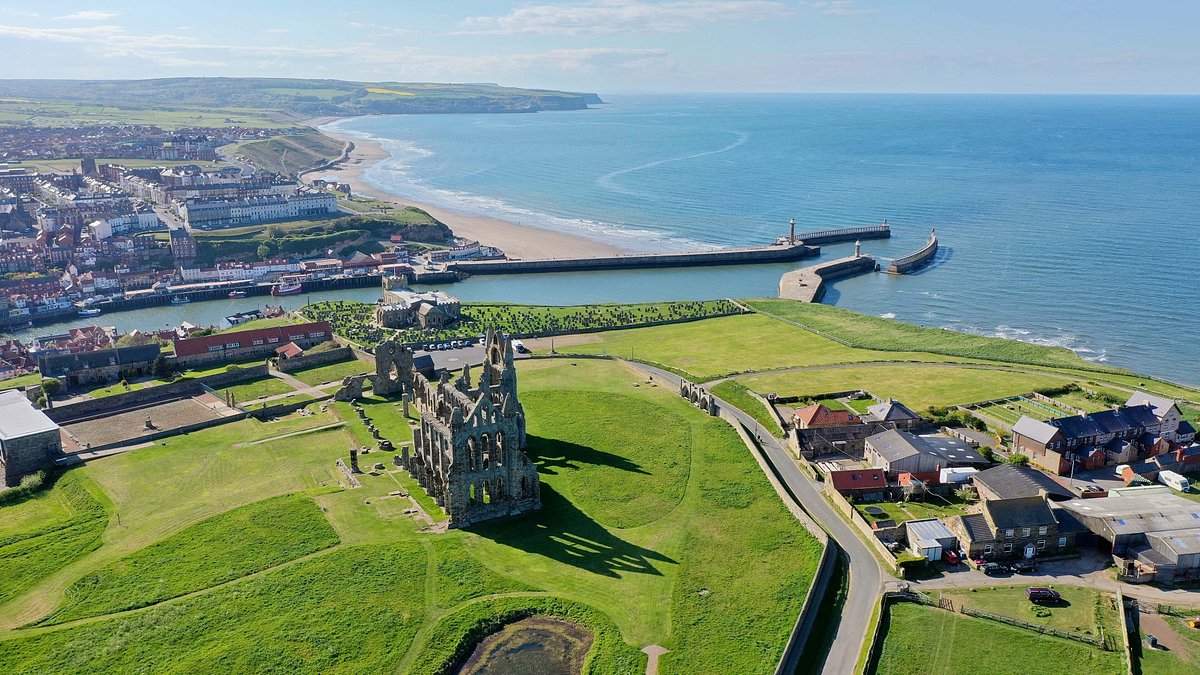

IMAGES
VIDEO
COMMENTS
Talking of passports, yes, a newborn baby does need a passport. You can apply for your baby's first UK passport at the British Passport Office. You do have to pay for your baby's first passport and it may take longer than adult passport renewals, so make sure you apply for it in plenty of time.
Travelling with a baby or toddler: top tips. Try to organise your baby's passport in plenty of time (GOV.UK, 2018a). NB: this will involve the most hilarious photoshoot of your life. If you are travelling to countries where you need a visa, you'll need to sort that out too (GOV.UK, 2012).
Your baby can travel soon after they're born as long as it's safe for them to do so. Each airline sets its own restrictions but most won't allow babies under two weeks to fly. If your baby was premature you may have to wait longer. Bear in mind that your baby will need a passport and, if necessary, a visa.
Keep an eye out for spare seats. If your flight is under-booked then there maybe spares where you and your child can stretch out for a nap if your own seats are too cramped. But make sure to stay with your child if they want to move. Sucky sweets, as mentioned before, can help ears pop, so be sure to bring some.
To enable you to get your child's first UK passport you must first prove that they are eligible for British nationality; this can be done by providing a full British birth/adoption or naturalisation certificate for the child. ... A first time child passport costs £46.00 for standard postal service (4-6 weeks) and £87.00 for fast-track one ...
Avoid giving your baby salad foods or uncooked and raw foods to minimise their risks of becoming unwell. Avoid shellfish whilst abroad. Essential travel documentation such as passports, European Health Insurance Card and travel insurance. Remember your baby will need a passport if you are going abroad. If you are flying, check with the airline ...
One of the first steps in getting a British passport for your newborn is to gather the required documents. You will need: A digital passport photo of your baby is required. HM Passport Office has the strictest standards regarding passport photo requirements, even for newborns. When applying through U.K.ABROAD, you will be advised of these ...
Age related: a child's passport is usually valid for five years (Simon Calder) After the Home Office 's defective "online passport checker" ruined family holidays by generating absurd ...
Applying for your babies first passport online. Complete the form on the website. Get a baby passport photo. Prepare the documents. Pay! Get someone to confirm your babies identity. .. sit back and wait! How to apply for babies first passport By Post. Get a paper form from the Post Office.
In conclusion, obtaining your baby's first passport is an essential step for UK-based parents planning international travel. While the process may seem daunting at first, understanding the requirements and following the necessary steps can make it a manageable and even rewarding experience.
2. Provide the baby's birth certificate and two photographs with the application. 3. Pay the £49 application fee. 4. Track the status of the application online. If you found this post on getting a passport for a baby helpful, you may want to read more of our Before You Go articles.
To fly with a baby, parents usually need the baby's passport photo and an official document confirming maternity. In some cases, it is also necessary to carry a copy of the birth certificate. In addition, the child needs a visa or travel permit in most countries. It is strongly recommended to find out about all the necessary documents before ...
Your baby will need a passport to travel from birth. If you have no intention of travelling for some time then there is no need to rush into this. The passport only lasts 5 years, so don't bother getting one until you need it. If you have a trip lined up for after the birth, you will want to consider whether you will do a routine application ...
Your baby's official birth certificate: You will need the official birth certificate and, as a safeguard, you may want to bring along a digital back-up and a photocopy of the original as well. Proof of U.S. citizenship: If you are traveling fairly soon after your baby's birth, you may not have your infant's official birth certificate yet.
If the child is traveling unaccompanied and aged between 12-16 years, they will be required to produce photographic ID. For UK. When travelling with an infant on a domestic route, it's a good idea to bring either a birth certificate or passport to prove date of birth. International-A valid passport is required for all ages.
EC Regulation 444/2009: States that as of June 26th 2012, children travelling from, to or through all Schengen countries plus Bulgaria, Cyprus and Romania are no longer permitted to travel on a parent's passport, and are required to hold their own individual travel documentation. Entries on one of their parent's passports are no longer valid.
The IATA Travel Centre can advise you which documents are required for each country you'll be visiting or transiting. Enter your child's date of birth so that the extra requirements are displayed. Check the IATA Travel Centre. Tickets for infants, children and young adults. These are the age categories we use when you make a booking with us ...
There are additional legal requirements for children who are in the care of, or are placed with, foster parents or legal guardians. All children under the age of 15 must have an adult sign their child passport application, regardless of circumstance. Contact a VisaCentral specialist for specific guardianship information by email info@uk ...
Documents for minors travelling in the EU. In addition to their own valid passport or ID card, all children travelling: may need an extra (official) document signed by their parents, second parent or legal guardian (s) authorising them to travel. There are no EU rules on this matter, each EU country decides if it requires the child to have an ...
Children of European Union citizens travelling from, to or via EU countries need to carry their own passport or ID card. Having their names entered in their parent's passports is no longer permitted. This restriction does not apply to document holders of the United Kingdom or Ireland. Consent form for minors.
Each country has specific requirements for minors travelling without their parents or legal guardians and what documentation is required. It is each passenger's responsibility to ensure that these specific document requirements are fully met. You can find what documents are needed for minors travelling within the EU here. You can also confirm ...
It now costs £88.50 to get, renew or replace your passport if you apply online, up from £82.50, or £100 for a postal application, up from £93. An online application for a child's passport ...
It now costs £88.50 to get, renew or replace your passport if you apply online, up from £82.50, or £100 for a postal application, up from £93. An online application for a child's passport ...
However, we allow a baby bag up to 5kg (dimensions: 45x35x20cms) for babies travelling on an adult's lap. Adults travelling with infants must sit at a window seat as there are 2 oxygen masks provided above these selected seats. There are baby changing facilities on board located at the rear of the aircraft.
2 - 15 years old. Children between these ages cannot travel unless they are accompanied by an adult who is 16 years or older. Unaccompanied children aged 15 and under are not permitted to travel alone and will not be permitted to board the plane as easyJet does not provide an escort service or special requirements for unaccompanied children.
The UK Child Visa, is a type of visa that allows citizens or residents of the United Kingdom with no immigration restrictions to bring their non-EU child in the UK. Therefore, the main criterion for a child to be eligible for this type of visa, is to have one of their parents already residing in the UK. The requirements for this type of visa ...
Can newborn babies travel without a passport in the UK? Everyone who is travelling abroad needs a passport, even very young babies. A child passport is valid for five years. The Passport Office ...
Travel within the UK. If you are travelling by aeroplane within the UK (yes - even including Northern Ireland) then you do not need a passport. You will however usually be asked for reliable photographic ID such as a current photographic driver's license. Children under 16 accompanied by an adult who can vouch for them are not required to ...
North Yorkshire... 1. Re: Passport for children travelling to Northern Ireland. Given that Northern Ireland is in the UK, therefore this is a domestic flight, adult passengers need photographic ID - such as, but nt necessarily , a passport. children under 16 do not require anything if they are travelling with their parents.
I understand from various answers here, and from .gov.uk that I don't need a passport to travel to Ireland: I can just show my UK driver's license. But what if I'm travelling with a 10 year old child who does not have a passport, and obviously no driving license either.